Subscribe to the podcast to download all lesson audios for free.
 The famous poem by Gonçalves Dias entitled “Canção do exílio” speaks of a longing to hear the song of the sabiá, which is a type of thrush. Most Brazilians know about the poem, but not everyone knows a lot about the national bird, the sabiá. In today’s lesson you can get up to speed on all of it
The famous poem by Gonçalves Dias entitled “Canção do exílio” speaks of a longing to hear the song of the sabiá, which is a type of thrush. Most Brazilians know about the poem, but not everyone knows a lot about the national bird, the sabiá. In today’s lesson you can get up to speed on all of it
 YouTube is such a part of our everyday life, no wonder we want to create our own channel. But if you want to talk about YouTube channels in Portuguese, there are some words and phrases that will help you out. And that is the object of today’s lesson.
YouTube is such a part of our everyday life, no wonder we want to create our own channel. But if you want to talk about YouTube channels in Portuguese, there are some words and phrases that will help you out. And that is the object of today’s lesson.
 Some people just seem to see the good in everyone, and others seem to point out the flaws. In today’s lesson Mara has written another blog, and does she ever bring up some emotions and opinions. Whether positive of negative, this lesson helps us to express ourselves in Portuguese.
Some people just seem to see the good in everyone, and others seem to point out the flaws. In today’s lesson Mara has written another blog, and does she ever bring up some emotions and opinions. Whether positive of negative, this lesson helps us to express ourselves in Portuguese.
 Have you ever been to one of those restaurants where you pay by weight. They are extremely popular in Brazil. However, the question in today’s lesson is whether or not is makes sense to pay for food by weight. Some think it’s convenient and logical, others find it inconvenient and illogical. Either way, we learn some great Portuguese verbs to talk about the self-service restaurants.
Have you ever been to one of those restaurants where you pay by weight. They are extremely popular in Brazil. However, the question in today’s lesson is whether or not is makes sense to pay for food by weight. Some think it’s convenient and logical, others find it inconvenient and illogical. Either way, we learn some great Portuguese verbs to talk about the self-service restaurants.
 It’s so easy to ignore the warning lights that go off, but in this case the tire looks a little low too. It’s a good thing that friends can help out, check the tires and even take things in to a mechanic if needed. And if you ever need to make that request in Portuguese, today’s lesson’s got you covered.
It’s so easy to ignore the warning lights that go off, but in this case the tire looks a little low too. It’s a good thing that friends can help out, check the tires and even take things in to a mechanic if needed. And if you ever need to make that request in Portuguese, today’s lesson’s got you covered.
 Do you love or hate shopping? People seem to fall into one of those camps. And how does your love/hate of shopping change when you get to do it online? Or does it change when you are shopping for cloths or for tools? All of this goes into our shopping patterns, and in this lesson we do it in Portuguese.
Do you love or hate shopping? People seem to fall into one of those camps. And how does your love/hate of shopping change when you get to do it online? Or does it change when you are shopping for cloths or for tools? All of this goes into our shopping patterns, and in this lesson we do it in Portuguese.
 Sometimes we just want to go back to our comfort food. And in today’s lesson, that means going back to a traditional Brazilian breakfast, complete with papaya, bread, butter, and coffee with milk. It’s a pretty great way to start a day, and even more so when you can talk about it in Portuguese.
Sometimes we just want to go back to our comfort food. And in today’s lesson, that means going back to a traditional Brazilian breakfast, complete with papaya, bread, butter, and coffee with milk. It’s a pretty great way to start a day, and even more so when you can talk about it in Portuguese.
 It’s one thing to think of salad as a fresh, healthy food. But we’ve all had the experience of opening the fridge, only to find that the lettuce is brown, the tomatoes are old, and the cucumbers are mushy. It’s enough to take away your appetite. It doesn’t matter what language you are using, that kind of food is gross.
It’s one thing to think of salad as a fresh, healthy food. But we’ve all had the experience of opening the fridge, only to find that the lettuce is brown, the tomatoes are old, and the cucumbers are mushy. It’s enough to take away your appetite. It doesn’t matter what language you are using, that kind of food is gross.
 How in the world does a person figure out what makes a good cachaça? Color, smell, taste, and what brands are recommended? This lesson is our chance to get you started in knowing how to talk about cachaça and caipirinha.Drinking it, well, we’ll leave that up to you.
How in the world does a person figure out what makes a good cachaça? Color, smell, taste, and what brands are recommended? This lesson is our chance to get you started in knowing how to talk about cachaça and caipirinha.Drinking it, well, we’ll leave that up to you.
 The age old question about what to do on the weekend. And of course that question is more difficult to answer when the forecast says it’s going to rain. Looks like the beach will have to wait for another day. And while you are making those decisions, we’ll help you to discuss the options in Portuguese.
The age old question about what to do on the weekend. And of course that question is more difficult to answer when the forecast says it’s going to rain. Looks like the beach will have to wait for another day. And while you are making those decisions, we’ll help you to discuss the options in Portuguese.
 Since someone is stopping by the supermarket anyway, it’s only polite to ask if there is anything you need. It’s always nice to be nice! And today we learn how to be nice in Portuguese too.
Since someone is stopping by the supermarket anyway, it’s only polite to ask if there is anything you need. It’s always nice to be nice! And today we learn how to be nice in Portuguese too.
 We sometimes think that it would be nice to join a gym, but it gets rather intimidating when we see all of the sign up procedures, there’s a lot of pressure. Still, we know it’s a good thing to work out, so maybe it’s time to buckle down and do it. In today’s lesson the process is at least made a little easier when a friend can give some advice about what to expect.
We sometimes think that it would be nice to join a gym, but it gets rather intimidating when we see all of the sign up procedures, there’s a lot of pressure. Still, we know it’s a good thing to work out, so maybe it’s time to buckle down and do it. In today’s lesson the process is at least made a little easier when a friend can give some advice about what to expect.
 What kind of present do you get when you know that your friend is a little particular about things? Go ahead and bat around a few ideas, but it may be easier just to get a gift coupon and let him get what he wants later. And to help the discussion move along, in today’s lesson we do it all in Portuguese.
What kind of present do you get when you know that your friend is a little particular about things? Go ahead and bat around a few ideas, but it may be easier just to get a gift coupon and let him get what he wants later. And to help the discussion move along, in today’s lesson we do it all in Portuguese.
 What’s more entertaining, watching the little kids play ball or watch the parents as the reaction to their children who are playing ball. In today’s lesson some parents are in the bleachers chatting as their kids are playing. Both seem to be fairly chill, which is good because sometimes the parents can go a little crazy. Nothing crazy about learning how to talk about this in Portuguese.
What’s more entertaining, watching the little kids play ball or watch the parents as the reaction to their children who are playing ball. In today’s lesson some parents are in the bleachers chatting as their kids are playing. Both seem to be fairly chill, which is good because sometimes the parents can go a little crazy. Nothing crazy about learning how to talk about this in Portuguese.
 How big of a statement are you making when you wear clothing with your teams name and logo? For some it’s a bold declaration of passion, for others it was merely a clean shirt in the closet. Either way, it’s bound to call attention, which as learners of Portuguese is a perfect excuse to strike up a conversation.
How big of a statement are you making when you wear clothing with your teams name and logo? For some it’s a bold declaration of passion, for others it was merely a clean shirt in the closet. Either way, it’s bound to call attention, which as learners of Portuguese is a perfect excuse to strike up a conversation.
 Sometimes we feel pressed and want to get out of the supermarket as quickly as possible. Other days we are OK with slowing down the pace a little bit. In today’s lesson somebody is nice enough to let another go first in the checkout line. No doubt that someday the good deed will be paid back, and somebody will let you in line as well. And at least we’ll have enough Portuguese to thank them appropriately if this happens in Brazil.
Sometimes we feel pressed and want to get out of the supermarket as quickly as possible. Other days we are OK with slowing down the pace a little bit. In today’s lesson somebody is nice enough to let another go first in the checkout line. No doubt that someday the good deed will be paid back, and somebody will let you in line as well. And at least we’ll have enough Portuguese to thank them appropriately if this happens in Brazil.
 We all relate to the pressure of how to react to a hair cut, especially when we go with a new look or a new style. The good news is that in today’s dialog not only does our friend notice, but she lets us know that the new style is working well, está linda! Thank goodness, because we are always taking a chance with a new hair style.
We all relate to the pressure of how to react to a hair cut, especially when we go with a new look or a new style. The good news is that in today’s dialog not only does our friend notice, but she lets us know that the new style is working well, está linda! Thank goodness, because we are always taking a chance with a new hair style.
 Salgadinhos, those salty snack foods that we all love to eat, even if do so with a little sense of guilt, knowing that they just can’t be all that healthy of an option. Still, in today’s lesson we give you a pretty good list of many of the salgadinhos that you should try. And, as long as you don’t go too crazy, feel free to eat them without feely guilty.
Salgadinhos, those salty snack foods that we all love to eat, even if do so with a little sense of guilt, knowing that they just can’t be all that healthy of an option. Still, in today’s lesson we give you a pretty good list of many of the salgadinhos that you should try. And, as long as you don’t go too crazy, feel free to eat them without feely guilty.
 What’s better than finding the perfect shoes online? Having a friend who recognizes how good looking those shoes are, and then asks you about them. Don’t worry, in the dialog we promise to send you the link, in Portuguese of course.
What’s better than finding the perfect shoes online? Having a friend who recognizes how good looking those shoes are, and then asks you about them. Don’t worry, in the dialog we promise to send you the link, in Portuguese of course.
 We spend so much of our life in bed, it really shows that getting the right bed is probably a big deal. But what do you do when the bed is uncomfortable. It may be that buying another one will change things, or maybe not. It’s such a hard decision, but at least we’ll give you the language necessary to make that decision in Portuguese.
We spend so much of our life in bed, it really shows that getting the right bed is probably a big deal. But what do you do when the bed is uncomfortable. It may be that buying another one will change things, or maybe not. It’s such a hard decision, but at least we’ll give you the language necessary to make that decision in Portuguese.
 Some days we work so long and so hard at work that we don’t evn realize how long we’ve been sitting. It’s good to get up, move around, stretch your body, divert your attention to something else, can take a break. Even better, take a load off with a friend or colleague, and sit down for a refreshing coffee break. And even better yet, learn how to do so in Portuguese.
Some days we work so long and so hard at work that we don’t evn realize how long we’ve been sitting. It’s good to get up, move around, stretch your body, divert your attention to something else, can take a break. Even better, take a load off with a friend or colleague, and sit down for a refreshing coffee break. And even better yet, learn how to do so in Portuguese.
 The age-old question, ‘how do I look?’ In today’s lesson we not only learn how to answer that question in Portuguese, but we answer it with style, with flattering words, and without delay. You learn much more than just language in our Língua da Gente lessons.
The age-old question, ‘how do I look?’ In today’s lesson we not only learn how to answer that question in Portuguese, but we answer it with style, with flattering words, and without delay. You learn much more than just language in our Língua da Gente lessons.
 Asking a friend how his or her weekend was is much more than just a question. It’s a way of showing them that you care and that you are interested in them as people, more than just a colleague at work. In today’s lesson we find out that even staying home for the weekend is nice, and it’s nice to know that your friend asks about you too.
Asking a friend how his or her weekend was is much more than just a question. It’s a way of showing them that you care and that you are interested in them as people, more than just a colleague at work. In today’s lesson we find out that even staying home for the weekend is nice, and it’s nice to know that your friend asks about you too.
 It’s so easy to get off of our routine, especially when traveling a lot. However, for those with diabetes, it’s important to still watch what we eat, keep up on medications, and maintain our exercise programs. Easier said than done, right? And in this lesson we add one more element, talking about all of this in Portuguese. We can do it, and chances are we’ll feel much better too.
It’s so easy to get off of our routine, especially when traveling a lot. However, for those with diabetes, it’s important to still watch what we eat, keep up on medications, and maintain our exercise programs. Easier said than done, right? And in this lesson we add one more element, talking about all of this in Portuguese. We can do it, and chances are we’ll feel much better too.
 There is nothing more fun that taking on your best friend in a game of one-on-one. The problem is that your friend is pretty bad at keeping the score. In today’s lesson we not only learn how to talk about the score in Portuguese, but we also learn how to help our friend keep score!
There is nothing more fun that taking on your best friend in a game of one-on-one. The problem is that your friend is pretty bad at keeping the score. In today’s lesson we not only learn how to talk about the score in Portuguese, but we also learn how to help our friend keep score!
 What’s more frustrating than to have the weather be beautiful all week, and then on the weekend, precisely when you have time to get outside, it decides to rain! Well, at least in the dialog we find out that it isn’t very cold outside. But really, gente, when is this rain going to stop!
What’s more frustrating than to have the weather be beautiful all week, and then on the weekend, precisely when you have time to get outside, it decides to rain! Well, at least in the dialog we find out that it isn’t very cold outside. But really, gente, when is this rain going to stop!
 So how does a doctor know if we have high blood pressure because of diet, exercise, and health, or high blood pressure because we are nervous about being in a doctor’s office? In the end, we’ve got to take care of the high blood pressure, and in today’s lesson the doctor is taking the steps necessary to do so. Whether you say “hypertension” or “high pressure” we’ll give you the Portuguese to talk about how to make you feel better.
So how does a doctor know if we have high blood pressure because of diet, exercise, and health, or high blood pressure because we are nervous about being in a doctor’s office? In the end, we’ve got to take care of the high blood pressure, and in today’s lesson the doctor is taking the steps necessary to do so. Whether you say “hypertension” or “high pressure” we’ll give you the Portuguese to talk about how to make you feel better.
 In English we talk about a “proud papa” and in Portuguese with call somebody a “papai coruja”. “Coruja” is the word for “owl” and isn’t that a beautiful way to describe somebody who looks like he is proud. In today’s lesson we learn how to talk about being excited for things.
In English we talk about a “proud papa” and in Portuguese with call somebody a “papai coruja”. “Coruja” is the word for “owl” and isn’t that a beautiful way to describe somebody who looks like he is proud. In today’s lesson we learn how to talk about being excited for things.
 None of us likes to visit the doctor, delaying things as long as possible. But, sometimes we just know that it really is important to get a professional to look at things. In today’s lesson it’s a good thing that we went to the doctor because he thinks that we might have bronchitis. And it’s a good thing that we learn how to talk about all of this in Portuguese too. Thank you Doctor, thank you.
None of us likes to visit the doctor, delaying things as long as possible. But, sometimes we just know that it really is important to get a professional to look at things. In today’s lesson it’s a good thing that we went to the doctor because he thinks that we might have bronchitis. And it’s a good thing that we learn how to talk about all of this in Portuguese too. Thank you Doctor, thank you.
 We’ve all been there. You meet somebody, forget their name, and then see them again down the road. You might as well be honest and simply ask them their name. And in today’s lesson we get to live that experience in Portuguese.
We’ve all been there. You meet somebody, forget their name, and then see them again down the road. You might as well be honest and simply ask them their name. And in today’s lesson we get to live that experience in Portuguese.
 You gotta love them, but you also gotta get ready for invitations to eat more, and more and more. It’s just their way of saying that they love you. So, take a deep breadth, fill up that plate, and have another helping.
You gotta love them, but you also gotta get ready for invitations to eat more, and more and more. It’s just their way of saying that they love you. So, take a deep breadth, fill up that plate, and have another helping.
 As part of our ‘small talk’ series, here’s an example of how to finally introduce yourself to a person that you have seen for a long time. Finally, it’s good to meet you!
As part of our ‘small talk’ series, here’s an example of how to finally introduce yourself to a person that you have seen for a long time. Finally, it’s good to meet you!
 Outside of Brazil, we sometimes hear more about São Paulo and Rio than we do about other regions in Brazil. In today’s lesson we get to focus on one of Brazil’s hidden gems, Santa Catarina. Get ready, because you are about to find out about a ton of great things to see and do in Santa Catarina. *Photo courtesy of Dircinha Welter (all rights reserved).
Outside of Brazil, we sometimes hear more about São Paulo and Rio than we do about other regions in Brazil. In today’s lesson we get to focus on one of Brazil’s hidden gems, Santa Catarina. Get ready, because you are about to find out about a ton of great things to see and do in Santa Catarina. *Photo courtesy of Dircinha Welter (all rights reserved).
 Nestlé, Garoto or Lacta, in Brazil the question is which chocolate brand we like the most. After today’s lesson, even if you can’t decide, you can at least explain the argument to defend one brand over another.
Nestlé, Garoto or Lacta, in Brazil the question is which chocolate brand we like the most. After today’s lesson, even if you can’t decide, you can at least explain the argument to defend one brand over another.
 Without a doubt Florianopolis is one of those fantastic cities that makes Santa Catarina shine Even if you have never been there, this lesson gives you a change to talk about it and ask others about their opinions of this classic city.
Without a doubt Florianopolis is one of those fantastic cities that makes Santa Catarina shine Even if you have never been there, this lesson gives you a change to talk about it and ask others about their opinions of this classic city.
 Sometimes we just hit the end of the day and we run out of gas. If you just aren’t into pushing it another minute, today we learn how to tell people that we just ought to go to bed. Admit it, we all need this lesson!
Sometimes we just hit the end of the day and we run out of gas. If you just aren’t into pushing it another minute, today we learn how to tell people that we just ought to go to bed. Admit it, we all need this lesson!
 How do couples decide whose turn it is to change a dirty diaper? Is it best to take turns, trade days, alternate between wet and dirty? We’ll let you decide the strategy, but what we can help you with is how to talk about changing diapers in Portuguese.
How do couples decide whose turn it is to change a dirty diaper? Is it best to take turns, trade days, alternate between wet and dirty? We’ll let you decide the strategy, but what we can help you with is how to talk about changing diapers in Portuguese.
 Among the Portuguese skills that we all need, ordering a quick snack and a drink rank high on the list. Potentially you will need this skill on a daily basis. We’ve got you covered and in this lesson we make sure you won’t starve to death while in Brazil!
Among the Portuguese skills that we all need, ordering a quick snack and a drink rank high on the list. Potentially you will need this skill on a daily basis. We’ve got you covered and in this lesson we make sure you won’t starve to death while in Brazil!
 It’s one thing to eat sweets and candies, it’s another to make homemade sweets. For Brazilians, this begins with brigadeiro, which can be simple or elegant. We wish that we could promise that anyone who learns how to speak Portuguese will automatically know how to make brigadeiros. Truth told, however, all we can say is that you’ll know how to order them!
It’s one thing to eat sweets and candies, it’s another to make homemade sweets. For Brazilians, this begins with brigadeiro, which can be simple or elegant. We wish that we could promise that anyone who learns how to speak Portuguese will automatically know how to make brigadeiros. Truth told, however, all we can say is that you’ll know how to order them!
 Do you know how to tie a tie? Isn’t there something about a rabbit going around the hole and then back in the hole? If that is too complicated, let’s teach you how to tie a tie in Portuguese. Here we go!
Do you know how to tie a tie? Isn’t there something about a rabbit going around the hole and then back in the hole? If that is too complicated, let’s teach you how to tie a tie in Portuguese. Here we go!
 What a play on words, a restaurant called “São Duíche”! We’ve got São Paulo, São Jorge, São Caetano, we might as well add a São Duíche, the patron saint of those who love “sanduíches” or sandwiches. This is going to be a fun Portuguese language lesson!
What a play on words, a restaurant called “São Duíche”! We’ve got São Paulo, São Jorge, São Caetano, we might as well add a São Duíche, the patron saint of those who love “sanduíches” or sandwiches. This is going to be a fun Portuguese language lesson!
 One of the great things about Brazil, musically, is that the different regions are extremely diverse. From the Northeast region you will hear music that has almost a reggae type of rhythm, fast and slow, that is played with accordion, a triangle, and a drum called a zabumba. In today’s lesson we talk about forró, baião, and xote. You are gonna love it.
One of the great things about Brazil, musically, is that the different regions are extremely diverse. From the Northeast region you will hear music that has almost a reggae type of rhythm, fast and slow, that is played with accordion, a triangle, and a drum called a zabumba. In today’s lesson we talk about forró, baião, and xote. You are gonna love it.
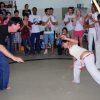 How is it possible to watch capoeira and not want to give it a try? Even if you don’t think you could ever make those moves, there is still a part of you that at least wants to play the berimbau. In today’s lesson we at least get you started, by giving you some Portuguese language skills related to talking about capoeira.
How is it possible to watch capoeira and not want to give it a try? Even if you don’t think you could ever make those moves, there is still a part of you that at least wants to play the berimbau. In today’s lesson we at least get you started, by giving you some Portuguese language skills related to talking about capoeira.
 They say that millions of people are playing Pokemon Go, and as you think of it, what a unique way to practice speaking Portuguese. It’s got to be a new combination. And even if you are not into Pokemon, here’s a chance to learn more Portuguese.
They say that millions of people are playing Pokemon Go, and as you think of it, what a unique way to practice speaking Portuguese. It’s got to be a new combination. And even if you are not into Pokemon, here’s a chance to learn more Portuguese.
 Ice cream is already one of life’s great pleasures, and this is even more the case in a place where tropical fruits give us even more new flavor options. So let’s talk about ice cream, your favorite flavors, your favorite places to buy it, and who to share it with.
Ice cream is already one of life’s great pleasures, and this is even more the case in a place where tropical fruits give us even more new flavor options. So let’s talk about ice cream, your favorite flavors, your favorite places to buy it, and who to share it with.
 Of course we’d like to say that we are always productive with our time. But sometimes it’s nice just to chill in front of the TV and let the evening pass away in 100% rest and relaxation. Don’t make it a daily habit, but now and again, why not? And why not in Portuguese?
Of course we’d like to say that we are always productive with our time. But sometimes it’s nice just to chill in front of the TV and let the evening pass away in 100% rest and relaxation. Don’t make it a daily habit, but now and again, why not? And why not in Portuguese?
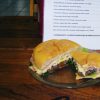 Forget the famous food chains, if you want a burger in Brazil, check out the guy with the corner stand. Brazilian X-tudo comes with all the extras, and when we day “tudo” we mean everything. Bring it on, and bring on a lesson to talk about it in Portuguese.
Forget the famous food chains, if you want a burger in Brazil, check out the guy with the corner stand. Brazilian X-tudo comes with all the extras, and when we day “tudo” we mean everything. Bring it on, and bring on a lesson to talk about it in Portuguese.
 Some people like subtitles and others hate them. But you’ve got to consider what a dubbed movies sounds like too. Especially when watching foreign movies, it’s just nice to hear the original voices. No matter your preference, in this lesson we learn to talk about it in Portuguese.
Some people like subtitles and others hate them. But you’ve got to consider what a dubbed movies sounds like too. Especially when watching foreign movies, it’s just nice to hear the original voices. No matter your preference, in this lesson we learn to talk about it in Portuguese.
 For some suit coats look sharp, and for others they simply look restricting. And no doubt, when they fit just right, they look much better. That is the decision in today’s lesson, to buy or not to buy a new suit. And don’t forget to get a new tie too.
For some suit coats look sharp, and for others they simply look restricting. And no doubt, when they fit just right, they look much better. That is the decision in today’s lesson, to buy or not to buy a new suit. And don’t forget to get a new tie too.
 How many times do you send and receive texts per day? For some it is over 100 times, every day. Given that, we have to have a lesson about all the new options when texting.
How many times do you send and receive texts per day? For some it is over 100 times, every day. Given that, we have to have a lesson about all the new options when texting.
 There are times when we all wish that we were poets, right? Wouldn’t it be great to write verses that inspire others, or cause others to feel a certain way? Even if that dream is beyond your current reach, at least we can appreciate the poetry of others. Today we learn to talk about the characteristics of classic sonnets.
There are times when we all wish that we were poets, right? Wouldn’t it be great to write verses that inspire others, or cause others to feel a certain way? Even if that dream is beyond your current reach, at least we can appreciate the poetry of others. Today we learn to talk about the characteristics of classic sonnets.
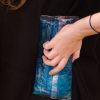 What is more frustrating than back pain? Do you rest more or stretch more? Do you exercise more, or exercise less? Do you take medicine, or stop taking medicine. We can’t relieve the pain, but we can help you talk about it in Portuguese.
What is more frustrating than back pain? Do you rest more or stretch more? Do you exercise more, or exercise less? Do you take medicine, or stop taking medicine. We can’t relieve the pain, but we can help you talk about it in Portuguese.
 There are times when we all wish that we were poets, right? Wouldn’t it be great to write verses that inspire others, or cause others to feel a certain way? Even if that dream is beyond your current reach, at least we can appreciate the poetry of others. Today we learn to talk about the characteristics of classic sonnets.
There are times when we all wish that we were poets, right? Wouldn’t it be great to write verses that inspire others, or cause others to feel a certain way? Even if that dream is beyond your current reach, at least we can appreciate the poetry of others. Today we learn to talk about the characteristics of classic sonnets.
 Be honest, even in your native language it is hard to understand the flight announcements at airports, right? But don’t worry, we’ll get you prepared for them in Portuguese, and with luck you’ll even you’re your flight and it will get off on time.
Be honest, even in your native language it is hard to understand the flight announcements at airports, right? But don’t worry, we’ll get you prepared for them in Portuguese, and with luck you’ll even you’re your flight and it will get off on time.
 Taking pictures with modern-day cameras is a breeze, well kind of, right? Digital camera have so many settings, if can be pretty confusing, almost enough to say that it’s easier just to use your cellphone. But don’t fret just yet, we’ll get you talking about camera’s in Portuguese!
Taking pictures with modern-day cameras is a breeze, well kind of, right? Digital camera have so many settings, if can be pretty confusing, almost enough to say that it’s easier just to use your cellphone. But don’t fret just yet, we’ll get you talking about camera’s in Portuguese!
 Aren’t you still amazed when you see that a video on YouTube has been viewed over a million times! Really, millions of hits, amazing. In today’s lesson we’ve got people posting things on YouTube and Facebook. Oh my!
Aren’t you still amazed when you see that a video on YouTube has been viewed over a million times! Really, millions of hits, amazing. In today’s lesson we’ve got people posting things on YouTube and Facebook. Oh my!
 Backseat drivers, gotta love ‘em! Well, not really, but in today’s lesson we at least appreciate where they are coming from, but we also learn to tell them to calm down a bit.
Backseat drivers, gotta love ‘em! Well, not really, but in today’s lesson we at least appreciate where they are coming from, but we also learn to tell them to calm down a bit.
 Every time you turn around there is a new way to socialize with others. When it comes to chatting with friends, do you prefer WhatsApp or Facebook? That’s the topic we tackle in today’s lesson.
Every time you turn around there is a new way to socialize with others. When it comes to chatting with friends, do you prefer WhatsApp or Facebook? That’s the topic we tackle in today’s lesson.
 So how weird is it when your brother or sister gets married? I mean really, you’ve seen your brother as the little kid who tags along, and now somebody loves him enough to spend her life with him! Yep, that’s today’s lesson, and fortunately, everybody loves the new sister-in-law.
So how weird is it when your brother or sister gets married? I mean really, you’ve seen your brother as the little kid who tags along, and now somebody loves him enough to spend her life with him! Yep, that’s today’s lesson, and fortunately, everybody loves the new sister-in-law.
 Sure, it’s convenient to be able to write in multiple languages, but sometimes the auto-correct messes you up too. No problem, in today’s lesson we talk about how to set up your phone to type in either English or Portuguese.
Sure, it’s convenient to be able to write in multiple languages, but sometimes the auto-correct messes you up too. No problem, in today’s lesson we talk about how to set up your phone to type in either English or Portuguese.
 No doubt, the current political scene in Brazil is going through a difficult period. Still, we should be able to talk about it without being mean and ugly. That is how our people see it, and that is how our lesson flows today. Ah, if everyone could approach it this way!
No doubt, the current political scene in Brazil is going through a difficult period. Still, we should be able to talk about it without being mean and ugly. That is how our people see it, and that is how our lesson flows today. Ah, if everyone could approach it this way!
 Go ahead, say that you hate Facebook, but then be honest, how many times do you check it each day? Check up on old friends, find out whose birthday it is, post photos of yesterday’s party. In this lesson Andreia really didn’t want those pictures to go public. Too late, and everyone “likes” them a lot.
Go ahead, say that you hate Facebook, but then be honest, how many times do you check it each day? Check up on old friends, find out whose birthday it is, post photos of yesterday’s party. In this lesson Andreia really didn’t want those pictures to go public. Too late, and everyone “likes” them a lot.
 Bahia, if food doesn’t come to mind as the very first thing, chances are that it’s the still one of the top associations. Vatapá, caruru, moqueca, it just seems that the never-ending list of great foods just sparkle with a Bahia shine. In today’s lesson we focus on the food that perhaps most we most associate with Bahia: Acarajé. Listen to Andreia and Antonio tell us how acarajé is made.
Bahia, if food doesn’t come to mind as the very first thing, chances are that it’s the still one of the top associations. Vatapá, caruru, moqueca, it just seems that the never-ending list of great foods just sparkle with a Bahia shine. In today’s lesson we focus on the food that perhaps most we most associate with Bahia: Acarajé. Listen to Andreia and Antonio tell us how acarajé is made.
 There is never a good time to have a cold. But why does it feel that each cold is the worst one ever. We feel bad for you, and we hope you get the rest and medicine that you need. It may be of small consolation, but at least you can talk about your cold in Portuguese now, if you want to.
There is never a good time to have a cold. But why does it feel that each cold is the worst one ever. We feel bad for you, and we hope you get the rest and medicine that you need. It may be of small consolation, but at least you can talk about your cold in Portuguese now, if you want to.
 Parents, gotta love them. They worry about their kids, especially when the kids arrive home late at night. Well, don’t worry, because if you worry, we’ll give you the words to do so in Portuguese.
Parents, gotta love them. They worry about their kids, especially when the kids arrive home late at night. Well, don’t worry, because if you worry, we’ll give you the words to do so in Portuguese.
 It’s OK to experiment with new recipes, but sometimes it’s better not to mess with a good thing. In today’s lesson we find out that the old soup recipe was just fine. Leave well enough alone. Well, nothing ventured, nothing gained. And in this case we all gain in learning some more Portuguese.
It’s OK to experiment with new recipes, but sometimes it’s better not to mess with a good thing. In today’s lesson we find out that the old soup recipe was just fine. Leave well enough alone. Well, nothing ventured, nothing gained. And in this case we all gain in learning some more Portuguese.
 Lots of us have great memories of watching grandma making jams and preserves. Picking the fruits, adding the sugar, putting it in jars, ahh the good old days with granny. In today’s lesson we reminisce about all of this and how great it was to have grandma around!
Lots of us have great memories of watching grandma making jams and preserves. Picking the fruits, adding the sugar, putting it in jars, ahh the good old days with granny. In today’s lesson we reminisce about all of this and how great it was to have grandma around!
 Out of all the appliances that one might need in the kitchen, for many the microwave oven is the most used. Cooking, what do you mean cooking? We just heat things up, right? No matter how you use the microwave, in today’s lesson we learn to talk about it in Portuguese.
Out of all the appliances that one might need in the kitchen, for many the microwave oven is the most used. Cooking, what do you mean cooking? We just heat things up, right? No matter how you use the microwave, in today’s lesson we learn to talk about it in Portuguese.
 Feiras or markets, what a fantastic way to enjoy a couple of hours, do some excellent shopping, and also hear tons of everyday language. Remember to taste the foods, just see verify the ones that you really want to buy. In today’s lesson the seller has some good bananas, but the buyer is also looking for some tangerines. Enjoy!
Feiras or markets, what a fantastic way to enjoy a couple of hours, do some excellent shopping, and also hear tons of everyday language. Remember to taste the foods, just see verify the ones that you really want to buy. In today’s lesson the seller has some good bananas, but the buyer is also looking for some tangerines. Enjoy!
 Living the Olympic dream! If you were in the Olympics, what sport would you like to compete in? Bring it on, and bring it on in Portuguese.
Living the Olympic dream! If you were in the Olympics, what sport would you like to compete in? Bring it on, and bring it on in Portuguese.
 The Olympic motto is “faster, higher, stronger.” For some of us, we really get into the pure Olympic spirit. For others of us, we are way too cynical to buy into that. Where is your focus? Whatever side you fall on, here’s a change to talk about it in Portuguese.
The Olympic motto is “faster, higher, stronger.” For some of us, we really get into the pure Olympic spirit. For others of us, we are way too cynical to buy into that. Where is your focus? Whatever side you fall on, here’s a change to talk about it in Portuguese.
 Sweeping, sculling, really, how does one figure out all of these rowing options? The truth is that it is fun to watch, even if you don’t get all the details. So gather the crew and the coxswain and learn how to talk about rowing in Portuguese.
Sweeping, sculling, really, how does one figure out all of these rowing options? The truth is that it is fun to watch, even if you don’t get all the details. So gather the crew and the coxswain and learn how to talk about rowing in Portuguese.
 Let’s be honest, they say that dive was a 9.6 or a 9.7, but didn’t they all look the same to the untrained eye? After a few days of watching Olympics we start to think that we really do see a difference. Either way, now we can talk about those points in Portuguese.
Let’s be honest, they say that dive was a 9.6 or a 9.7, but didn’t they all look the same to the untrained eye? After a few days of watching Olympics we start to think that we really do see a difference. Either way, now we can talk about those points in Portuguese.
 How sad would it be to train for years and years, and then be disqualified for a false start. That’s part of the Olympic drama and part of the lesson for today.
How sad would it be to train for years and years, and then be disqualified for a false start. That’s part of the Olympic drama and part of the lesson for today.
 Medal count, some say that it takes away from the Olympic games and others think it is the very reason for the Olympics. How is your country doing in the total medal count?
Medal count, some say that it takes away from the Olympic games and others think it is the very reason for the Olympics. How is your country doing in the total medal count?
 How can those athletes combine such grace and strength, it’s amazing. After today’s lesson we will be able to use Portuguese to describe such moves in gymnastics.
How can those athletes combine such grace and strength, it’s amazing. After today’s lesson we will be able to use Portuguese to describe such moves in gymnastics.
 We have been looking forward to this for years. The Olympics are coming to Brazil and now we have to decide if we are going to attend the events live. After today’s lesson, you should be more excited than ever to attend.
We have been looking forward to this for years. The Olympics are coming to Brazil and now we have to decide if we are going to attend the events live. After today’s lesson, you should be more excited than ever to attend.
 So the Olympics are coming, but now we need to purchase tickets. Which events would you like to see most? Let’s just hope that they aren’t too difficult to come by. At least after this lesson we’ll have the Portuguese ability to talk about our tickets.
So the Olympics are coming, but now we need to purchase tickets. Which events would you like to see most? Let’s just hope that they aren’t too difficult to come by. At least after this lesson we’ll have the Portuguese ability to talk about our tickets.
 We have been looking forward to this for years. The Olympics are coming to Brazil and now we have to decide if we are going to attend the events live. After today’s lesson, you should be more excited than ever to attend.
We have been looking forward to this for years. The Olympics are coming to Brazil and now we have to decide if we are going to attend the events live. After today’s lesson, you should be more excited than ever to attend.
 Some of the most tender moments in life are when we get to hold a baby, especially in those quiet hours in the night when it is just you and the baby. But man, it’s exhausting to keep up that pace! Still, after today’s lesson, we’ll be able to talk about those moments in Portuguese too.
Some of the most tender moments in life are when we get to hold a baby, especially in those quiet hours in the night when it is just you and the baby. But man, it’s exhausting to keep up that pace! Still, after today’s lesson, we’ll be able to talk about those moments in Portuguese too.
 Some people catch on to new technologies with no problems, others struggle with the new learning curve. Take for example the time you tried to teach grandma how to use a computer. In today’s lesson we tackle that problem, in Portuguese no less!
Some people catch on to new technologies with no problems, others struggle with the new learning curve. Take for example the time you tried to teach grandma how to use a computer. In today’s lesson we tackle that problem, in Portuguese no less!
 When it comes to plastic surgery, the joke is that there are no ugly women, just poor husbands. Of course plastic surgery is not the solution to all beauty issues, and in today’s lesson Marco does a good job of reassuring his wife that she is beautiful. After today’s lesson you will be able to do the same, with or without plastic surgery.
When it comes to plastic surgery, the joke is that there are no ugly women, just poor husbands. Of course plastic surgery is not the solution to all beauty issues, and in today’s lesson Marco does a good job of reassuring his wife that she is beautiful. After today’s lesson you will be able to do the same, with or without plastic surgery.
 There is no question that grandparents love to be with the grandchildren. The hard part is choosing the activities that the kiddos enjoy. In today’s lesson that activity is not the circus, but after this lesson you will have the Portuguese to talk about other possible ways to entertain the grandchildren.
There is no question that grandparents love to be with the grandchildren. The hard part is choosing the activities that the kiddos enjoy. In today’s lesson that activity is not the circus, but after this lesson you will have the Portuguese to talk about other possible ways to entertain the grandchildren.
 How do you keep those houseplants alive? For some it is easy, for others there is no hope. Do you have a green thumb? And if so, and you talk about it in Portuguese? After today’s lesson you will be one step closer (at least in talking about it).
How do you keep those houseplants alive? For some it is easy, for others there is no hope. Do you have a green thumb? And if so, and you talk about it in Portuguese? After today’s lesson you will be one step closer (at least in talking about it).
 We all know that we need this lesson. Who hasn’t lost the remote? All remote just seem to disappear, and the same is true in Brazil. We can’t guarantee that it will be any easier to find the remote, but after this lesson you will at least be able to ask for it in Portuguese.
We all know that we need this lesson. Who hasn’t lost the remote? All remote just seem to disappear, and the same is true in Brazil. We can’t guarantee that it will be any easier to find the remote, but after this lesson you will at least be able to ask for it in Portuguese.
 More and more Brazilians are traveling abroad, and what an exciting thing it is to see. In today’s lesson our Brazilians are in New York City, and look how fun it is to see the Empire State Building. Of course, we will want to be able to talk about all of this in Portuguese.
More and more Brazilians are traveling abroad, and what an exciting thing it is to see. In today’s lesson our Brazilians are in New York City, and look how fun it is to see the Empire State Building. Of course, we will want to be able to talk about all of this in Portuguese.
 We know that people love their pets, and we love ours too. But really, if the only thing that people like about you more than their pet is that you don’t shed hair all over, well that’s not much of a complement. Still, it sounds better in Portuguese.
We know that people love their pets, and we love ours too. But really, if the only thing that people like about you more than their pet is that you don’t shed hair all over, well that’s not much of a complement. Still, it sounds better in Portuguese.
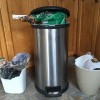 Wow, that garbage can is starting to smell bad. Either we learn some Portuguese to talk about taking the trash out, or we take out the trash ourselves. Either way, this lesson has got to help us clear the air a bit.
Wow, that garbage can is starting to smell bad. Either we learn some Portuguese to talk about taking the trash out, or we take out the trash ourselves. Either way, this lesson has got to help us clear the air a bit.
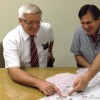 You love your job, but it’s your boss who makes things difficult, right? Hey, we feel your pain, and after this lesson, we’ll be able to feel your pain, and talk about it, in Portuguese.
You love your job, but it’s your boss who makes things difficult, right? Hey, we feel your pain, and after this lesson, we’ll be able to feel your pain, and talk about it, in Portuguese.
 What is this, some kind of torture! When it comes to waxing and plucking eyebrows, you women have an incredible threshold of pain. We admire that, and after this lesson, that admiration can be expressed in Portuguese.
What is this, some kind of torture! When it comes to waxing and plucking eyebrows, you women have an incredible threshold of pain. We admire that, and after this lesson, that admiration can be expressed in Portuguese.
 Don’t you hate it when you run out of milk! How can one be expected to eat cereal for breakfast when there is no milk. Oops, let’s take that back. Brazilians don’t eat cold cereal for breakfast. Still, if someone is going to the store, let’s learn how to ask them to pick up some milk.
Don’t you hate it when you run out of milk! How can one be expected to eat cereal for breakfast when there is no milk. Oops, let’s take that back. Brazilians don’t eat cold cereal for breakfast. Still, if someone is going to the store, let’s learn how to ask them to pick up some milk.
 Nobody likes to have to pay the bills, but when the amount is even more than usual, it is even more difficult to accept. In today’s lesson the electric bill is way too high. Find out whose fault that is.
Nobody likes to have to pay the bills, but when the amount is even more than usual, it is even more difficult to accept. In today’s lesson the electric bill is way too high. Find out whose fault that is.
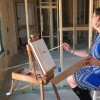 Careful! One of life’s most challenging questions, “Honey, do I look fat in this dress?” Of course the answer is ‘no.’ And in today’s lesson we learn how to subtly handle this task in Portuguese.
Careful! One of life’s most challenging questions, “Honey, do I look fat in this dress?” Of course the answer is ‘no.’ And in today’s lesson we learn how to subtly handle this task in Portuguese.
 Of course not everyone loves soccer, but everyone should be able to join in on conversations about soccer. And what better way to talk the talk than to visit the soccer museum in São Paulo? So here we go, who was better Pelé or Garrincha? Maradona or Messi?.
Of course not everyone loves soccer, but everyone should be able to join in on conversations about soccer. And what better way to talk the talk than to visit the soccer museum in São Paulo? So here we go, who was better Pelé or Garrincha? Maradona or Messi?.
 Casual clothing, what could be better than a casual afternoon, comfortable clothing, informal settings, and a feeling of chill? Well, for some the answer is that dressing up and looking fine more fun than life in a t-shirt and shorts. Whatever side you fall on, here’s the Portuguese language to go with it.
Casual clothing, what could be better than a casual afternoon, comfortable clothing, informal settings, and a feeling of chill? Well, for some the answer is that dressing up and looking fine more fun than life in a t-shirt and shorts. Whatever side you fall on, here’s the Portuguese language to go with it.
 They say that the way to make progress is to keep track of progress. If so, the Fitbit has got you covered, counting all of your steps each day. Bring it on, and good luck in out-distancing your friends. Even more, now you can talk about it in Portuguese.
They say that the way to make progress is to keep track of progress. If so, the Fitbit has got you covered, counting all of your steps each day. Bring it on, and good luck in out-distancing your friends. Even more, now you can talk about it in Portuguese.
 No doubt, our lessons are about Portuguese, but how can somebody resist good Italian food? And where do you find some of the world’s best Italian food? In São Paulo, Brazil of course. Enjoy a large serving of lasagna and enjoy the lesson about food.
No doubt, our lessons are about Portuguese, but how can somebody resist good Italian food? And where do you find some of the world’s best Italian food? In São Paulo, Brazil of course. Enjoy a large serving of lasagna and enjoy the lesson about food.
 All that sneezing and runny nose! You’ve got a cold, poor thing. Chances are you aren’t in the mood to do a lot of talking, but in this lesson at least you can learn about how to talk about it.
All that sneezing and runny nose! You’ve got a cold, poor thing. Chances are you aren’t in the mood to do a lot of talking, but in this lesson at least you can learn about how to talk about it.
 Security, network safety, computer hacking, wifi networks, passwords, where does it stop? Are we being prudently cautious or just paranoid? That is the topic in today’s lesson, and come away with lots of new vocabulary related to high tech as well.
Security, network safety, computer hacking, wifi networks, passwords, where does it stop? Are we being prudently cautious or just paranoid? That is the topic in today’s lesson, and come away with lots of new vocabulary related to high tech as well.
 We can pretend that the reason that we are traveling to Brazil is to work or to study, but in this lesson we learn how to confess what really motivates our travel. Listen and find out what.
We can pretend that the reason that we are traveling to Brazil is to work or to study, but in this lesson we learn how to confess what really motivates our travel. Listen and find out what.
 Some love those television shows about health, well-being, fitness, and relationships. Others think that they are a lot of nonsense. Informative or entertainment, helpful or deceiving, in this lesson we get to talk about all of this in Portuguese.
Some love those television shows about health, well-being, fitness, and relationships. Others think that they are a lot of nonsense. Informative or entertainment, helpful or deceiving, in this lesson we get to talk about all of this in Portuguese.
 We love our pets. Well, mostly we love our pets, but they can be a lot of work. In today’s lesson the dog runs away. But just how sad is that going to make everyone?
We love our pets. Well, mostly we love our pets, but they can be a lot of work. In today’s lesson the dog runs away. But just how sad is that going to make everyone?
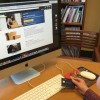 Shopping online can be extremely convenient, but is it secure? Some love to buy everything online and others would rather go to the store. In this lesson we learn to talk about online shopping.
Shopping online can be extremely convenient, but is it secure? Some love to buy everything online and others would rather go to the store. In this lesson we learn to talk about online shopping.
 It doesn’t take much effort to wish someone a pleasant day, and the small effort just makes our day better. So after this lesson, you will be able to make people feel better in Portuguese too.
It doesn’t take much effort to wish someone a pleasant day, and the small effort just makes our day better. So after this lesson, you will be able to make people feel better in Portuguese too.
 Android or Apple, that is a question we all seem to face nowadays. Cost, quality, reputations, features, there is a lot that goes into the decision. Whichever you decide to buy, this lesson gives you the vocabulary to talk about the issues involved. Good luck in your purchase.
Android or Apple, that is a question we all seem to face nowadays. Cost, quality, reputations, features, there is a lot that goes into the decision. Whichever you decide to buy, this lesson gives you the vocabulary to talk about the issues involved. Good luck in your purchase.
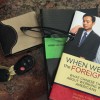 If most of us had a dime for every time we misplace our keys, we would all be able to finance our next trip to Brazil. And yet, misplacing keys and being to ask about them in Portuguese are two different things. By the end of this lesson, you will at least know how to ask about them, even if you still have a habit of losing them.
If most of us had a dime for every time we misplace our keys, we would all be able to finance our next trip to Brazil. And yet, misplacing keys and being to ask about them in Portuguese are two different things. By the end of this lesson, you will at least know how to ask about them, even if you still have a habit of losing them.
 We all know, it’s one thing to exercise, but we still need to watch what we eat. Looks like in this lesson we learn that by eating less salt and by drinking less coffee, chances are that our blood pressure will improve. At least that is what we hope, and now that hope can be expressed in Portuguese too.
We all know, it’s one thing to exercise, but we still need to watch what we eat. Looks like in this lesson we learn that by eating less salt and by drinking less coffee, chances are that our blood pressure will improve. At least that is what we hope, and now that hope can be expressed in Portuguese too.
 Kids, they grow up so fast. And if you haven’t seen them for a while, all of a sudden they seem to have grown up. It is the most natural of conversations, asking how the family is doing. And after this lesson, you will be able to do more of that in Portuguese.
Kids, they grow up so fast. And if you haven’t seen them for a while, all of a sudden they seem to have grown up. It is the most natural of conversations, asking how the family is doing. And after this lesson, you will be able to do more of that in Portuguese.
 Oh, Oh! Looks like Daniela and Marcos broke up, but nobody told Elisângela about it. Oops, of course she didn’t mean anything by her comments, but it would have been nice if someone had told her what was going ton. At least in your case, you will learn how to deal with this type of situation in Portuguese.
Oh, Oh! Looks like Daniela and Marcos broke up, but nobody told Elisângela about it. Oops, of course she didn’t mean anything by her comments, but it would have been nice if someone had told her what was going ton. At least in your case, you will learn how to deal with this type of situation in Portuguese.
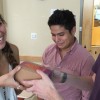 Everyone is passing out the gifts, and it looks like João didn’t get anything. Well, how sad is that! Even if we don’t have anything to make him feel better, at least we can come out of this lesson with new ways in Portuguese to talk about it.
Everyone is passing out the gifts, and it looks like João didn’t get anything. Well, how sad is that! Even if we don’t have anything to make him feel better, at least we can come out of this lesson with new ways in Portuguese to talk about it.
 Going to the movies is much more involved than it used to be. You used to be able to just choose the movie. Now you decide on 3D, fancy seats, assigned seating, apps to download, meals and treats, early shows, it’s much more involved. Still, the language you need to talk about what you like and dislike about the movies, you’ve got it in this lesson.
Going to the movies is much more involved than it used to be. You used to be able to just choose the movie. Now you decide on 3D, fancy seats, assigned seating, apps to download, meals and treats, early shows, it’s much more involved. Still, the language you need to talk about what you like and dislike about the movies, you’ve got it in this lesson.
 Truth told, if you learn Portuguese for no other reason than to simply listen to Brazilian music, you have got a perfect reason to learn the language. This lesson will get you started on talking about the music that you like.
Truth told, if you learn Portuguese for no other reason than to simply listen to Brazilian music, you have got a perfect reason to learn the language. This lesson will get you started on talking about the music that you like.
 It’s always nice to wake up in a hotel and head on down to a buffet breakfast. Especially in Brazil this means that you get lots of fresh fruit, juices, breads, cheeses, and something hot to drink. After today’s lesson you should be able to find out how to get to breakfast, and hopefully know what time it is served too.
It’s always nice to wake up in a hotel and head on down to a buffet breakfast. Especially in Brazil this means that you get lots of fresh fruit, juices, breads, cheeses, and something hot to drink. After today’s lesson you should be able to find out how to get to breakfast, and hopefully know what time it is served too.
 Sometimes it is difficult to ask for information on the phone, partly because you cannot see who you are talking to. In today’s lesson we make things a little easier by giving you the words that you need to say and the words that you will probably hear.
Sometimes it is difficult to ask for information on the phone, partly because you cannot see who you are talking to. In today’s lesson we make things a little easier by giving you the words that you need to say and the words that you will probably hear.
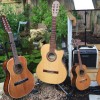 Buying a guitar can be complicated. There are so many types and styles. It’s a good thing that Andreia is helping Antonio to choose the appropriate one for his son. And even better, it gives us a chance to learn about this in Portuguese.
Buying a guitar can be complicated. There are so many types and styles. It’s a good thing that Andreia is helping Antonio to choose the appropriate one for his son. And even better, it gives us a chance to learn about this in Portuguese.
 The subway in São Paulo is quite impressive, with new lines that have been added in recent years. It is easy to figure out, easy to get around, and very convenient. We do warn you, however, that the trains can get completely full. Get ready to squeeze in, but thanks to this lesson, you will be able to do so in Portuguese.
The subway in São Paulo is quite impressive, with new lines that have been added in recent years. It is easy to figure out, easy to get around, and very convenient. We do warn you, however, that the trains can get completely full. Get ready to squeeze in, but thanks to this lesson, you will be able to do so in Portuguese.
 The fruit juices in Brazil are fantastic. Really, our recommendation is that among the first things you ever do in Brazil is to try the different fruit juices. There are hundreds of tropical fruits and many make excellent juices. This lesson will get you started, and you will also learn the Portuguese necessary to experience new flavors.
The fruit juices in Brazil are fantastic. Really, our recommendation is that among the first things you ever do in Brazil is to try the different fruit juices. There are hundreds of tropical fruits and many make excellent juices. This lesson will get you started, and you will also learn the Portuguese necessary to experience new flavors.
 Why are our dreams so weird? Really, it seems like our subconscious has some pretty creative ways to freak out while we sleep. And in today’s lesson we even learn to interpret the meaning of your bizarre dreams too, in Portuguese that is.
Why are our dreams so weird? Really, it seems like our subconscious has some pretty creative ways to freak out while we sleep. And in today’s lesson we even learn to interpret the meaning of your bizarre dreams too, in Portuguese that is.
 Shhh, I know everyone says, “sleeping like a baby” but please be more quiet because this one really is sleeping. And in today’s lesson we talk about babies and sleeping in Portuguese.
Shhh, I know everyone says, “sleeping like a baby” but please be more quiet because this one really is sleeping. And in today’s lesson we talk about babies and sleeping in Portuguese.
 Ah yes, the pleasure of sitting by the pool, talking to friends, and watching the kids playing in the water. You used to be the kids, and now look at you, passing on the tradition for another generation. Let’s talk about those good old days in Portuguese.
Ah yes, the pleasure of sitting by the pool, talking to friends, and watching the kids playing in the water. You used to be the kids, and now look at you, passing on the tradition for another generation. Let’s talk about those good old days in Portuguese.
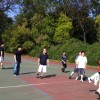 Girl talk, you know, “Who is that handsome guy over there?” Guys, it may be an illusion on your part. Chances are that they are not talking about you. But then again, maybe they are. And in today’s lesson, at least we learn to talk about other people in Portuguese.
Girl talk, you know, “Who is that handsome guy over there?” Guys, it may be an illusion on your part. Chances are that they are not talking about you. But then again, maybe they are. And in today’s lesson, at least we learn to talk about other people in Portuguese.
 “Oh, look at the cute little puppy!” Well, some love to look at the cute little puppy, but others can only think of the awful sensation of shedding hair, licked faces, and smelly fur. Whether you are a pet lover or a pet despiser, we’ve got you covered to talk about it in Portuguese.
“Oh, look at the cute little puppy!” Well, some love to look at the cute little puppy, but others can only think of the awful sensation of shedding hair, licked faces, and smelly fur. Whether you are a pet lover or a pet despiser, we’ve got you covered to talk about it in Portuguese.
 For some people singing in public is not a big deal, but for others it is really tough. And for those of you who think it is easy, have a little compassion on the rest of us, OK? And even if your singing is less than professional, after this lesson you will at least be able to talk about it in Portuguese.
For some people singing in public is not a big deal, but for others it is really tough. And for those of you who think it is easy, have a little compassion on the rest of us, OK? And even if your singing is less than professional, after this lesson you will at least be able to talk about it in Portuguese.
 Maybe it’s something you ate. Maybe you just ate too much. Or maybe you’ve caught some flu bug. Either way, you aren’t feeling very well, and chances are that you are going to throw up. And on that happy note, in today’s lesson we learn to talk about all of this in Portuguese!
Maybe it’s something you ate. Maybe you just ate too much. Or maybe you’ve caught some flu bug. Either way, you aren’t feeling very well, and chances are that you are going to throw up. And on that happy note, in today’s lesson we learn to talk about all of this in Portuguese!
 Let’s hope that section18 row 25 has good seats for whatever performance Daniela in our dialog is attending. And let’s also hope that they can follow the instructions to find those seats. In today’s lesson we learn the Portuguese phrases that you’ll need to get from one place to another.
Let’s hope that section18 row 25 has good seats for whatever performance Daniela in our dialog is attending. And let’s also hope that they can follow the instructions to find those seats. In today’s lesson we learn the Portuguese phrases that you’ll need to get from one place to another.
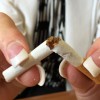 João has been trying to quit smoking. He’s not quite there yet, but looks like he is still motivated to kick the habit. Good thing for João. And good thing for us too, because we learn to talk about it in Portuguese.
João has been trying to quit smoking. He’s not quite there yet, but looks like he is still motivated to kick the habit. Good thing for João. And good thing for us too, because we learn to talk about it in Portuguese.
 We’ve all been there. The alarm clock doesn’t go off as expected and the next thing we know, somebody is yelling at us to get up. We’ve all been there. And in today’s lesson you can relive the moment in Portuguese!
We’ve all been there. The alarm clock doesn’t go off as expected and the next thing we know, somebody is yelling at us to get up. We’ve all been there. And in today’s lesson you can relive the moment in Portuguese!
 Poor old João, he’s been playing ball, comes home all sweating and hot. Should we give the guy a few minutes to cool down or should we tell him to go jump in the showers? He smells terrible, and it’s a good thing that in this lesson we can tell people to go take a bath in Portuguese.
Poor old João, he’s been playing ball, comes home all sweating and hot. Should we give the guy a few minutes to cool down or should we tell him to go jump in the showers? He smells terrible, and it’s a good thing that in this lesson we can tell people to go take a bath in Portuguese.
 Brazilian churrasco (barbecue) is world famous, especially among the beef lovers of the world. Probably two of the major features include the use of sea salt in the flavoring and the unique cuts of meat, including the well-known picanha. In today’s lesson however, we find out that picanha isn’t everyone’s favorite cut of meat.
Brazilian churrasco (barbecue) is world famous, especially among the beef lovers of the world. Probably two of the major features include the use of sea salt in the flavoring and the unique cuts of meat, including the well-known picanha. In today’s lesson however, we find out that picanha isn’t everyone’s favorite cut of meat.
 Oops, looks like some people just got caught at working doing something that they weren’t supposed to do. We’ll leave it up to your imagination to say what they were doing. However, in this lesson we’ll give you the specific words and grammar that you’ll need to talk about it, whatever it was.
Oops, looks like some people just got caught at working doing something that they weren’t supposed to do. We’ll leave it up to your imagination to say what they were doing. However, in this lesson we’ll give you the specific words and grammar that you’ll need to talk about it, whatever it was.
 We’ve all heard about the wonders of the açaí berry: antioxidants, fiber, low in fat, super energy, etc. Whether that is true or not, there are those who just love the taste of açaí smoothies. Others, however, just can’t get used to the unique taste. After this lesson, if you haven’t every tried açaí, you’ll wonder which side of the debate you will be on.
We’ve all heard about the wonders of the açaí berry: antioxidants, fiber, low in fat, super energy, etc. Whether that is true or not, there are those who just love the taste of açaí smoothies. Others, however, just can’t get used to the unique taste. After this lesson, if you haven’t every tried açaí, you’ll wonder which side of the debate you will be on.
 It’s always nice to meet someone new, and in this lesson we meet our new professor, who is nice enough to invite us in for a chat.
It’s always nice to meet someone new, and in this lesson we meet our new professor, who is nice enough to invite us in for a chat.
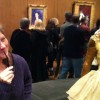 Some love museums, and others don’t. What is exceptionally exciting for one person, is the height of boredom for another. Either way, if you do go to the museum, don’t ruin it for the others by making wisecracks, snide comments, and ugly faces during the whole visit. Be nice, and in this lesson we learn to be nice about it in Portuguese.
Some love museums, and others don’t. What is exceptionally exciting for one person, is the height of boredom for another. Either way, if you do go to the museum, don’t ruin it for the others by making wisecracks, snide comments, and ugly faces during the whole visit. Be nice, and in this lesson we learn to be nice about it in Portuguese.
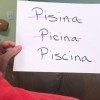 Do you know how in English we sometimes aren’t sure if words are spelled with an ‘s’ or a ‘c’? The same thing happens for Brazilians in Portuguese. There are some words that are harder to spell. Let’s learn about that in today’s lesson.
Do you know how in English we sometimes aren’t sure if words are spelled with an ‘s’ or a ‘c’? The same thing happens for Brazilians in Portuguese. There are some words that are harder to spell. Let’s learn about that in today’s lesson.
 The company may have a new conference room, but just try to make a reservation to use it. Others have it reserved for today. But don’t worry, tomorrow it’s available all day. And after today’s lesson, you be able to make the same reservations in Portuguese too.
The company may have a new conference room, but just try to make a reservation to use it. Others have it reserved for today. But don’t worry, tomorrow it’s available all day. And after today’s lesson, you be able to make the same reservations in Portuguese too.
 Really? I mean seriously! How is it possible for people to live in places where the winter temperatures are below freezing? We know that many people do, but for people like Marcos in today’s lesson, those cold temperatures are shocking! And that’s what we learn to talk about in today’s lesson.
Really? I mean seriously! How is it possible for people to live in places where the winter temperatures are below freezing? We know that many people do, but for people like Marcos in today’s lesson, those cold temperatures are shocking! And that’s what we learn to talk about in today’s lesson.
 In this lesson we not only learn how to talk about traveling, but we also get the added bonus of talking about Florianopolis, truly one of the jewels of the southern part of Brazil.
In this lesson we not only learn how to talk about traveling, but we also get the added bonus of talking about Florianopolis, truly one of the jewels of the southern part of Brazil.
 Buying perfume seems to be as complicated as choosing a fine wine. There is a combination of personal taste mixed with a knowledge about top notes, middle notes and a whole list of different scents and aromas. In this lesson we take on the task of buying perfume, and in the end, even the decorative bottle becomes part of the purchase decision.
Buying perfume seems to be as complicated as choosing a fine wine. There is a combination of personal taste mixed with a knowledge about top notes, middle notes and a whole list of different scents and aromas. In this lesson we take on the task of buying perfume, and in the end, even the decorative bottle becomes part of the purchase decision.
 Yeah, the new iPad is out, and Antonio wants to take a peek. Andreia, however, is skeptical. Is it a big deal, or just another excuse to spend money on a new toy? In today’s lesson we’ll see how much Brazilian adopt new foreign words into their everyday speech.
Yeah, the new iPad is out, and Antonio wants to take a peek. Andreia, however, is skeptical. Is it a big deal, or just another excuse to spend money on a new toy? In today’s lesson we’ll see how much Brazilian adopt new foreign words into their everyday speech.
 We all hope that someday, as a foreigner in Brazil, you have the opportunity to buy flowers. There is a delightful mix of the excitement in seeing the many new flowers, the relatively cheaper prices, and the fun of the exchange with the flower sellers. In this lesson we should learn some of the Portuguese that you’ll need for your flower-buying experience.
We all hope that someday, as a foreigner in Brazil, you have the opportunity to buy flowers. There is a delightful mix of the excitement in seeing the many new flowers, the relatively cheaper prices, and the fun of the exchange with the flower sellers. In this lesson we should learn some of the Portuguese that you’ll need for your flower-buying experience.
 What could it hurt, a little fried food for lunch, no big deal, right? If it means that you get to eat quibe, esfirra, coxinha and pastelzinhos, perhaps the extra calories are worth it. But then again, too much of a good thing might add on the extra pounds. After today’s lesson, you will be able to either order more fried foods or avoid more fried foods!
What could it hurt, a little fried food for lunch, no big deal, right? If it means that you get to eat quibe, esfirra, coxinha and pastelzinhos, perhaps the extra calories are worth it. But then again, too much of a good thing might add on the extra pounds. After today’s lesson, you will be able to either order more fried foods or avoid more fried foods!
 Some things are just difficult to translate, and the names of different Brazilian desserts definitely fall in that category. Truth told, tasting them is the only way to really know what we are talking about. Taste truly trumps translation. Still, after this lesson you will know a number of Brazilian desserts that you should at least try to taste sometime.
Some things are just difficult to translate, and the names of different Brazilian desserts definitely fall in that category. Truth told, tasting them is the only way to really know what we are talking about. Taste truly trumps translation. Still, after this lesson you will know a number of Brazilian desserts that you should at least try to taste sometime.
 Go ahead, make jokes about how soccer players fake injuries. Now, why don’t you try hitting your head with another guy’s cleats. We aren’t praising the violence; we’re just saying that it can get rough out there. After today’s lesson you can talk about soccer in Portuguese too.
Go ahead, make jokes about how soccer players fake injuries. Now, why don’t you try hitting your head with another guy’s cleats. We aren’t praising the violence; we’re just saying that it can get rough out there. After today’s lesson you can talk about soccer in Portuguese too.
 After today’s lesson we will all feel like we need to go back to elementary school, unless of course you already know how to calculate the area of a trapezoid. Just kidding, but after this lesson you will be able to identify some basic shapes in Portuguese.
After today’s lesson we will all feel like we need to go back to elementary school, unless of course you already know how to calculate the area of a trapezoid. Just kidding, but after this lesson you will be able to identify some basic shapes in Portuguese.
 Are you pretty happy with your height and weight? Remember that when you talk about that in Portuguese, you will have to switch to the metric system. So, just how tall are you and how much do you weigh? Learn how to talk about that in today’s lesson.
Are you pretty happy with your height and weight? Remember that when you talk about that in Portuguese, you will have to switch to the metric system. So, just how tall are you and how much do you weigh? Learn how to talk about that in today’s lesson.
 Going to the gym, working out, exercising, for some these words all carry a positive feeling. For others, they bring up feelings of dread or guilt. In today’s lesson Andreia is really into working out, or at least watching others work out. Cassia, not so much. And even if you are not in perfect shape, after today’s lesson you will at least be able to talk about it.
Going to the gym, working out, exercising, for some these words all carry a positive feeling. For others, they bring up feelings of dread or guilt. In today’s lesson Andreia is really into working out, or at least watching others work out. Cassia, not so much. And even if you are not in perfect shape, after today’s lesson you will at least be able to talk about it.
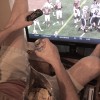 Do you know a creepy person? In this lesson we have a dialogue where we talk about other people, and we will learn how to refer to those who are lazy, rude and creepy in Portuguese. It has to be a useful lesson, right?
Do you know a creepy person? In this lesson we have a dialogue where we talk about other people, and we will learn how to refer to those who are lazy, rude and creepy in Portuguese. It has to be a useful lesson, right?
 When you gotta go, you gotta go, and in this lesson we’ve gotta go. But there is no way that we are using those dirty public bathrooms. You will thank us later when you know how to talk about this in Portuguese.
When you gotta go, you gotta go, and in this lesson we’ve gotta go. But there is no way that we are using those dirty public bathrooms. You will thank us later when you know how to talk about this in Portuguese.
 Men, we all relate to the pressure of being asked by a women if a certain article of clothing looks good or not. Ladies, ya’ll are beautiful, you can wear either the blue or the red blouse. You look great either way. However, we still need to learn how to handle this situation in Portuguese, and that is the objective of today’s lesson. And, we should learn the names of some colors too.
Men, we all relate to the pressure of being asked by a women if a certain article of clothing looks good or not. Ladies, ya’ll are beautiful, you can wear either the blue or the red blouse. You look great either way. However, we still need to learn how to handle this situation in Portuguese, and that is the objective of today’s lesson. And, we should learn the names of some colors too.
 Is it so frustrating to learn how to pronounce words in Portuguese. There are different sounds for all of the vowels and there don’t seem to be any rules. And those verb endings, it’s crazy! Never fear. In today’s lesson will give you a few hints along the way, and we’ll let you know that it’s really no big deal.
Is it so frustrating to learn how to pronounce words in Portuguese. There are different sounds for all of the vowels and there don’t seem to be any rules. And those verb endings, it’s crazy! Never fear. In today’s lesson will give you a few hints along the way, and we’ll let you know that it’s really no big deal.
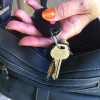 How is it possible that we always misplace our keys, even when they are in our pocket or purse! It happens all the time, admit it. So it only makes sense that we learn that same conversation in Portuguese, which is the topic of today’s lesson.
How is it possible that we always misplace our keys, even when they are in our pocket or purse! It happens all the time, admit it. So it only makes sense that we learn that same conversation in Portuguese, which is the topic of today’s lesson.
 One thing about Brazilian parties, there is no beginning or ending time. Come when you can, stay as long as you can. In this lesson we can teach you the grammar and vocabulary, but you need to bring the party attitude!
One thing about Brazilian parties, there is no beginning or ending time. Come when you can, stay as long as you can. In this lesson we can teach you the grammar and vocabulary, but you need to bring the party attitude!
 We can’t change the weather by talking about it, but at least it feels good to vent a little bit. Too hot, too cold, too rainy, today you will learn how to talk about the weather in Portuguese, even if nothing actually changes.
We can’t change the weather by talking about it, but at least it feels good to vent a little bit. Too hot, too cold, too rainy, today you will learn how to talk about the weather in Portuguese, even if nothing actually changes.
 Sometimes we never get tired of our favorite restaurants. In today’s lesson we learn how to suggest that we go back to our favorite once again. And, by the way, we do agree that comida mineira is excellent food!
Sometimes we never get tired of our favorite restaurants. In today’s lesson we learn how to suggest that we go back to our favorite once again. And, by the way, we do agree that comida mineira is excellent food!
 If you are inviting me to eat moqueca, you don’t need to invite me to twice. I’ll wash up and take a seat. And if you haven’t tried moqueca, at least this lesson gives you the vocabulary and grammar to talk about it.
If you are inviting me to eat moqueca, you don’t need to invite me to twice. I’ll wash up and take a seat. And if you haven’t tried moqueca, at least this lesson gives you the vocabulary and grammar to talk about it.
 It’s one of life’s great challenges, do you buy extra large to feel more comfortable or do you buy a large to not have to tell the world that you are getting a little fatter? Truth told, you are looking good either way, and today we learn how to talk about that in Portuguese.
It’s one of life’s great challenges, do you buy extra large to feel more comfortable or do you buy a large to not have to tell the world that you are getting a little fatter? Truth told, you are looking good either way, and today we learn how to talk about that in Portuguese.
 We hate to say it, but unfortunately things are more expensive. That’s just the way it’s going to be. At least in this lesson we can moan and groan about it a little bit in Portuguese.
We hate to say it, but unfortunately things are more expensive. That’s just the way it’s going to be. At least in this lesson we can moan and groan about it a little bit in Portuguese.
 Oh man, when we talk about how crowded the subways can be in Brazil, we really mean full. Put a smile on your face, squeeze in a little tighter, and plan on meeting new people in a personal way. In today’s lesson we learn about talking about subways, and suggesting that we take the subway.
Oh man, when we talk about how crowded the subways can be in Brazil, we really mean full. Put a smile on your face, squeeze in a little tighter, and plan on meeting new people in a personal way. In today’s lesson we learn about talking about subways, and suggesting that we take the subway.
 One of life’s most satisfying pleasures is to spend time at open outdoor markets, the feiras, as Brazilians call them. The sellers are amazing. They know exactly when the fruit will be ripe and they can help you choose the best one available. There’s also an art to how to settle on a price. In today’s lesson, we learn how to buy some mangos, one of the classic fruit treats that are found at feiras.
One of life’s most satisfying pleasures is to spend time at open outdoor markets, the feiras, as Brazilians call them. The sellers are amazing. They know exactly when the fruit will be ripe and they can help you choose the best one available. There’s also an art to how to settle on a price. In today’s lesson, we learn how to buy some mangos, one of the classic fruit treats that are found at feiras.
 So, should we walk or take a taxi? On one hand, plan on walking more in Brazil. On the other hand, taxi are not every expensive, especially with a small group of people. In today’s lesson we talk about walking and taking a taxi. And, it is a good chance to introduce you to the verb preferir ‘to prefer’ too.
So, should we walk or take a taxi? On one hand, plan on walking more in Brazil. On the other hand, taxi are not every expensive, especially with a small group of people. In today’s lesson we talk about walking and taking a taxi. And, it is a good chance to introduce you to the verb preferir ‘to prefer’ too.
 It is one thing to ask where the taxi stand is, but it is another thing to understand the response. A good part of understanding these instructions is related to how well one understands those pesky adverbs of location (e.g., to the right, to the left, etc.). And that is the objective behind today’s lesson.
It is one thing to ask where the taxi stand is, but it is another thing to understand the response. A good part of understanding these instructions is related to how well one understands those pesky adverbs of location (e.g., to the right, to the left, etc.). And that is the objective behind today’s lesson.
 So the word for Wednesday in Portuguese is something like ‘fourth market.’ OK, looks like we need to learn how to count the days of the week. In today’s lesson we learn about scheduling times to meet with a teacher, including days of the week.
So the word for Wednesday in Portuguese is something like ‘fourth market.’ OK, looks like we need to learn how to count the days of the week. In today’s lesson we learn about scheduling times to meet with a teacher, including days of the week.
 Not only is Paulo’s sister beautiful, looks like Paulo thinks he is pretty good looking too! In this lesson we learn how to give a complement, and ask someone what he or she thinks about things. Grammatically, we take on possessive pronouns (my, your, his, her, etc.).
Not only is Paulo’s sister beautiful, looks like Paulo thinks he is pretty good looking too! In this lesson we learn how to give a complement, and ask someone what he or she thinks about things. Grammatically, we take on possessive pronouns (my, your, his, her, etc.).
 We sincerely doubt that Paulo has some secret government job, but at least in this lesson you will learn how to ask people what type of job they have.
We sincerely doubt that Paulo has some secret government job, but at least in this lesson you will learn how to ask people what type of job they have.
 Wow, how long are those phone numbers in Brazil! Don’t worry, in this lesson we break it down into smaller chunks. And yes, Brazilians do say ‘celular’ for all types of mobile phones.
Wow, how long are those phone numbers in Brazil! Don’t worry, in this lesson we break it down into smaller chunks. And yes, Brazilians do say ‘celular’ for all types of mobile phones.
 Ah yes, the challenges of potty training our children. Is my child normal? When is the right time to start? Am I doing anything wrong? This lesson gets us into this topic, and all in Portuguese of course.
Ah yes, the challenges of potty training our children. Is my child normal? When is the right time to start? Am I doing anything wrong? This lesson gets us into this topic, and all in Portuguese of course.
 Morning sickness, cravings, wow, there are a lot of things that happen when a woman becomes pregnant. In this lesson we learn about how to talk about all of these things. And we sure hope that other fathers catch on quicker than the one in this dialog!
Morning sickness, cravings, wow, there are a lot of things that happen when a woman becomes pregnant. In this lesson we learn about how to talk about all of these things. And we sure hope that other fathers catch on quicker than the one in this dialog!
 Since you are trying to learn Portuguese, it only makes sense that we have a lesson on how to say the names of other languages too. And that is what today’s lesson is all about.
Since you are trying to learn Portuguese, it only makes sense that we have a lesson on how to say the names of other languages too. And that is what today’s lesson is all about.
 In today’s lesson we learn how to talk about one of the most characteristic foods of Brazil, feijoada. Think of a black bean stew with lots of different meats and the serve that over rice. You’ve got it, and for meat lovers, it is hard to resist.
In today’s lesson we learn how to talk about one of the most characteristic foods of Brazil, feijoada. Think of a black bean stew with lots of different meats and the serve that over rice. You’ve got it, and for meat lovers, it is hard to resist.
 Sure the daily specials are good too, but it is hard to beat the usual, which in today’s lesson is a cheese bacon burger with fries and a soft drink. Learn about how to invite your friends to try something new to eat.
Sure the daily specials are good too, but it is hard to beat the usual, which in today’s lesson is a cheese bacon burger with fries and a soft drink. Learn about how to invite your friends to try something new to eat.
 Sometimes we just can’t get away from our work. But really, is it more important than taking a break to go out to lunch with friends? In this lesson we learn about how to invite others to lunch. Hopefully you will be able to accept the invite, unlike Paulo in this lesson!
Sometimes we just can’t get away from our work. But really, is it more important than taking a break to go out to lunch with friends? In this lesson we learn about how to invite others to lunch. Hopefully you will be able to accept the invite, unlike Paulo in this lesson!
 Large cities in Brazil have thousands of public buses, all of them with complicated routes, hundreds of bus stops, and tons of different schedules. In this lesson we learn how to ask what streets a bus will go down, super practical information to for those who will be traveling in Brazil.
Large cities in Brazil have thousands of public buses, all of them with complicated routes, hundreds of bus stops, and tons of different schedules. In this lesson we learn how to ask what streets a bus will go down, super practical information to for those who will be traveling in Brazil.
 6:30am can seem so early sometimes! How about we sleep a little longer, OK? Learn how to ask what time it is, and while you are at it, suggest that we sleep just a little more.
6:30am can seem so early sometimes! How about we sleep a little longer, OK? Learn how to ask what time it is, and while you are at it, suggest that we sleep just a little more.
 Maybe socially we shouldn’t ask everyone their age, but after this lesson we will at least know how to do so, for those occasions when it is OK to ask. While we are at it, this lesson also gives us a nice introduction to the ver TER (to have) vs. ESTAR COM (to be with).
Maybe socially we shouldn’t ask everyone their age, but after this lesson we will at least know how to do so, for those occasions when it is OK to ask. While we are at it, this lesson also gives us a nice introduction to the ver TER (to have) vs. ESTAR COM (to be with).
 Everyone is going to the movies, and Susana is going too. Do you want to come along? In this lesson find out how, and while you are at it, learn all about the verb IR, (to go).
Everyone is going to the movies, and Susana is going too. Do you want to come along? In this lesson find out how, and while you are at it, learn all about the verb IR, (to go).
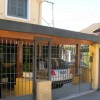 Anybody home?!!!! In this lesson we learn how to ask if anyone is home and we also get some hints about what Brazilians say when they invite someone to come into their home. Don’t worry, we are sure that they will tell you to make yourself comfortable.
Anybody home?!!!! In this lesson we learn how to ask if anyone is home and we also get some hints about what Brazilians say when they invite someone to come into their home. Don’t worry, we are sure that they will tell you to make yourself comfortable.
 Modern shopping malls in Brazil are called, shopping. Be careful however, because it is easy to get lost in the maze of floors and corridors. In today’s lesson, learn how to follow the instructions to get to the children’s clothing section on the fourth floor.
Modern shopping malls in Brazil are called, shopping. Be careful however, because it is easy to get lost in the maze of floors and corridors. In today’s lesson, learn how to follow the instructions to get to the children’s clothing section on the fourth floor.
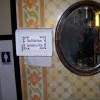 It’s one thing to ask where the bathroom is, but it is another thing to be able to understand the directions that are given too. In this case, is the bathroom on the left or on the right? Learn how to ask for directions, and then follow them as well.
It’s one thing to ask where the bathroom is, but it is another thing to be able to understand the directions that are given too. In this case, is the bathroom on the left or on the right? Learn how to ask for directions, and then follow them as well.
 Let’s see how Paulo is doing. Because when he is doing fine, we all feel better. In this lesson we learn how to ask people how they are doing. Even better, we learn how to respond to that question too.
Let’s see how Paulo is doing. Because when he is doing fine, we all feel better. In this lesson we learn how to ask people how they are doing. Even better, we learn how to respond to that question too.
 So where are you from? In this lesson we find out that Paulo is from Rio. And the young lady that he is talking to, she is from Brasilia, what some people call “Brazil’s big sky” country. Learn how to ask where somebody is from.
So where are you from? In this lesson we find out that Paulo is from Rio. And the young lady that he is talking to, she is from Brasilia, what some people call “Brazil’s big sky” country. Learn how to ask where somebody is from.
 The famous poem by Gonçalves Dias entitled “Canção do exílio” speaks of a longing to hear the song of the sabiá, which is a type of thrush. Most Brazilians know about the poem, but not everyone knows a lot about the national bird, the sabiá. In today’s lesson you can get up to speed on all of it
The famous poem by Gonçalves Dias entitled “Canção do exílio” speaks of a longing to hear the song of the sabiá, which is a type of thrush. Most Brazilians know about the poem, but not everyone knows a lot about the national bird, the sabiá. In today’s lesson you can get up to speed on all of it
 YouTube is such a part of our everyday life, no wonder we want to create our own channel. But if you want to talk about YouTube channels in Portuguese, there are some words and phrases that will help you out. And that is the object of today’s lesson.
YouTube is such a part of our everyday life, no wonder we want to create our own channel. But if you want to talk about YouTube channels in Portuguese, there are some words and phrases that will help you out. And that is the object of today’s lesson.
 Some people just seem to see the good in everyone, and others seem to point out the flaws. In today’s lesson Mara has written another blog, and does she ever bring up some emotions and opinions. Whether positive of negative, this lesson helps us to express ourselves in Portuguese.
Some people just seem to see the good in everyone, and others seem to point out the flaws. In today’s lesson Mara has written another blog, and does she ever bring up some emotions and opinions. Whether positive of negative, this lesson helps us to express ourselves in Portuguese.
 Have you ever been to one of those restaurants where you pay by weight. They are extremely popular in Brazil. However, the question in today’s lesson is whether or not is makes sense to pay for food by weight. Some think it’s convenient and logical, others find it inconvenient and illogical. Either way, we learn some great Portuguese verbs to talk about the self-service restaurants.
Have you ever been to one of those restaurants where you pay by weight. They are extremely popular in Brazil. However, the question in today’s lesson is whether or not is makes sense to pay for food by weight. Some think it’s convenient and logical, others find it inconvenient and illogical. Either way, we learn some great Portuguese verbs to talk about the self-service restaurants.
 It’s so easy to ignore the warning lights that go off, but in this case the tire looks a little low too. It’s a good thing that friends can help out, check the tires and even take things in to a mechanic if needed. And if you ever need to make that request in Portuguese, today’s lesson’s got you covered.
It’s so easy to ignore the warning lights that go off, but in this case the tire looks a little low too. It’s a good thing that friends can help out, check the tires and even take things in to a mechanic if needed. And if you ever need to make that request in Portuguese, today’s lesson’s got you covered.
 Do you love or hate shopping? People seem to fall into one of those camps. And how does your love/hate of shopping change when you get to do it online? Or does it change when you are shopping for cloths or for tools? All of this goes into our shopping patterns, and in this lesson we do it in Portuguese.
Do you love or hate shopping? People seem to fall into one of those camps. And how does your love/hate of shopping change when you get to do it online? Or does it change when you are shopping for cloths or for tools? All of this goes into our shopping patterns, and in this lesson we do it in Portuguese.
 Sometimes we just want to go back to our comfort food. And in today’s lesson, that means going back to a traditional Brazilian breakfast, complete with papaya, bread, butter, and coffee with milk. It’s a pretty great way to start a day, and even more so when you can talk about it in Portuguese.
Sometimes we just want to go back to our comfort food. And in today’s lesson, that means going back to a traditional Brazilian breakfast, complete with papaya, bread, butter, and coffee with milk. It’s a pretty great way to start a day, and even more so when you can talk about it in Portuguese.
 It’s one thing to think of salad as a fresh, healthy food. But we’ve all had the experience of opening the fridge, only to find that the lettuce is brown, the tomatoes are old, and the cucumbers are mushy. It’s enough to take away your appetite. It doesn’t matter what language you are using, that kind of food is gross.
It’s one thing to think of salad as a fresh, healthy food. But we’ve all had the experience of opening the fridge, only to find that the lettuce is brown, the tomatoes are old, and the cucumbers are mushy. It’s enough to take away your appetite. It doesn’t matter what language you are using, that kind of food is gross.
 How in the world does a person figure out what makes a good cachaça? Color, smell, taste, and what brands are recommended? This lesson is our chance to get you started in knowing how to talk about cachaça and caipirinha.Drinking it, well, we’ll leave that up to you.
How in the world does a person figure out what makes a good cachaça? Color, smell, taste, and what brands are recommended? This lesson is our chance to get you started in knowing how to talk about cachaça and caipirinha.Drinking it, well, we’ll leave that up to you.
 The age old question about what to do on the weekend. And of course that question is more difficult to answer when the forecast says it’s going to rain. Looks like the beach will have to wait for another day. And while you are making those decisions, we’ll help you to discuss the options in Portuguese.
The age old question about what to do on the weekend. And of course that question is more difficult to answer when the forecast says it’s going to rain. Looks like the beach will have to wait for another day. And while you are making those decisions, we’ll help you to discuss the options in Portuguese.
 Since someone is stopping by the supermarket anyway, it’s only polite to ask if there is anything you need. It’s always nice to be nice! And today we learn how to be nice in Portuguese too.
Since someone is stopping by the supermarket anyway, it’s only polite to ask if there is anything you need. It’s always nice to be nice! And today we learn how to be nice in Portuguese too.
 We sometimes think that it would be nice to join a gym, but it gets rather intimidating when we see all of the sign up procedures, there’s a lot of pressure. Still, we know it’s a good thing to work out, so maybe it’s time to buckle down and do it. In today’s lesson the process is at least made a little easier when a friend can give some advice about what to expect.
We sometimes think that it would be nice to join a gym, but it gets rather intimidating when we see all of the sign up procedures, there’s a lot of pressure. Still, we know it’s a good thing to work out, so maybe it’s time to buckle down and do it. In today’s lesson the process is at least made a little easier when a friend can give some advice about what to expect.
 What kind of present do you get when you know that your friend is a little particular about things? Go ahead and bat around a few ideas, but it may be easier just to get a gift coupon and let him get what he wants later. And to help the discussion move along, in today’s lesson we do it all in Portuguese.
What kind of present do you get when you know that your friend is a little particular about things? Go ahead and bat around a few ideas, but it may be easier just to get a gift coupon and let him get what he wants later. And to help the discussion move along, in today’s lesson we do it all in Portuguese.
 What’s more entertaining, watching the little kids play ball or watch the parents as the reaction to their children who are playing ball. In today’s lesson some parents are in the bleachers chatting as their kids are playing. Both seem to be fairly chill, which is good because sometimes the parents can go a little crazy. Nothing crazy about learning how to talk about this in Portuguese.
What’s more entertaining, watching the little kids play ball or watch the parents as the reaction to their children who are playing ball. In today’s lesson some parents are in the bleachers chatting as their kids are playing. Both seem to be fairly chill, which is good because sometimes the parents can go a little crazy. Nothing crazy about learning how to talk about this in Portuguese.
 How big of a statement are you making when you wear clothing with your teams name and logo? For some it’s a bold declaration of passion, for others it was merely a clean shirt in the closet. Either way, it’s bound to call attention, which as learners of Portuguese is a perfect excuse to strike up a conversation.
How big of a statement are you making when you wear clothing with your teams name and logo? For some it’s a bold declaration of passion, for others it was merely a clean shirt in the closet. Either way, it’s bound to call attention, which as learners of Portuguese is a perfect excuse to strike up a conversation.
 Sometimes we feel pressed and want to get out of the supermarket as quickly as possible. Other days we are OK with slowing down the pace a little bit. In today’s lesson somebody is nice enough to let another go first in the checkout line. No doubt that someday the good deed will be paid back, and somebody will let you in line as well. And at least we’ll have enough Portuguese to thank them appropriately if this happens in Brazil.
Sometimes we feel pressed and want to get out of the supermarket as quickly as possible. Other days we are OK with slowing down the pace a little bit. In today’s lesson somebody is nice enough to let another go first in the checkout line. No doubt that someday the good deed will be paid back, and somebody will let you in line as well. And at least we’ll have enough Portuguese to thank them appropriately if this happens in Brazil.
 We all relate to the pressure of how to react to a hair cut, especially when we go with a new look or a new style. The good news is that in today’s dialog not only does our friend notice, but she lets us know that the new style is working well, está linda! Thank goodness, because we are always taking a chance with a new hair style.
We all relate to the pressure of how to react to a hair cut, especially when we go with a new look or a new style. The good news is that in today’s dialog not only does our friend notice, but she lets us know that the new style is working well, está linda! Thank goodness, because we are always taking a chance with a new hair style.
 Salgadinhos, those salty snack foods that we all love to eat, even if do so with a little sense of guilt, knowing that they just can’t be all that healthy of an option. Still, in today’s lesson we give you a pretty good list of many of the salgadinhos that you should try. And, as long as you don’t go too crazy, feel free to eat them without feely guilty.
Salgadinhos, those salty snack foods that we all love to eat, even if do so with a little sense of guilt, knowing that they just can’t be all that healthy of an option. Still, in today’s lesson we give you a pretty good list of many of the salgadinhos that you should try. And, as long as you don’t go too crazy, feel free to eat them without feely guilty.
 What’s better than finding the perfect shoes online? Having a friend who recognizes how good looking those shoes are, and then asks you about them. Don’t worry, in the dialog we promise to send you the link, in Portuguese of course.
What’s better than finding the perfect shoes online? Having a friend who recognizes how good looking those shoes are, and then asks you about them. Don’t worry, in the dialog we promise to send you the link, in Portuguese of course.
 We spend so much of our life in bed, it really shows that getting the right bed is probably a big deal. But what do you do when the bed is uncomfortable. It may be that buying another one will change things, or maybe not. It’s such a hard decision, but at least we’ll give you the language necessary to make that decision in Portuguese.
We spend so much of our life in bed, it really shows that getting the right bed is probably a big deal. But what do you do when the bed is uncomfortable. It may be that buying another one will change things, or maybe not. It’s such a hard decision, but at least we’ll give you the language necessary to make that decision in Portuguese.
 Some days we work so long and so hard at work that we don’t evn realize how long we’ve been sitting. It’s good to get up, move around, stretch your body, divert your attention to something else, can take a break. Even better, take a load off with a friend or colleague, and sit down for a refreshing coffee break. And even better yet, learn how to do so in Portuguese.
Some days we work so long and so hard at work that we don’t evn realize how long we’ve been sitting. It’s good to get up, move around, stretch your body, divert your attention to something else, can take a break. Even better, take a load off with a friend or colleague, and sit down for a refreshing coffee break. And even better yet, learn how to do so in Portuguese.
 The age-old question, ‘how do I look?’ In today’s lesson we not only learn how to answer that question in Portuguese, but we answer it with style, with flattering words, and without delay. You learn much more than just language in our Língua da Gente lessons.
The age-old question, ‘how do I look?’ In today’s lesson we not only learn how to answer that question in Portuguese, but we answer it with style, with flattering words, and without delay. You learn much more than just language in our Língua da Gente lessons.
 Asking a friend how his or her weekend was is much more than just a question. It’s a way of showing them that you care and that you are interested in them as people, more than just a colleague at work. In today’s lesson we find out that even staying home for the weekend is nice, and it’s nice to know that your friend asks about you too.
Asking a friend how his or her weekend was is much more than just a question. It’s a way of showing them that you care and that you are interested in them as people, more than just a colleague at work. In today’s lesson we find out that even staying home for the weekend is nice, and it’s nice to know that your friend asks about you too.
 It’s so easy to get off of our routine, especially when traveling a lot. However, for those with diabetes, it’s important to still watch what we eat, keep up on medications, and maintain our exercise programs. Easier said than done, right? And in this lesson we add one more element, talking about all of this in Portuguese. We can do it, and chances are we’ll feel much better too.
It’s so easy to get off of our routine, especially when traveling a lot. However, for those with diabetes, it’s important to still watch what we eat, keep up on medications, and maintain our exercise programs. Easier said than done, right? And in this lesson we add one more element, talking about all of this in Portuguese. We can do it, and chances are we’ll feel much better too.
 There is nothing more fun that taking on your best friend in a game of one-on-one. The problem is that your friend is pretty bad at keeping the score. In today’s lesson we not only learn how to talk about the score in Portuguese, but we also learn how to help our friend keep score!
There is nothing more fun that taking on your best friend in a game of one-on-one. The problem is that your friend is pretty bad at keeping the score. In today’s lesson we not only learn how to talk about the score in Portuguese, but we also learn how to help our friend keep score!
 What’s more frustrating than to have the weather be beautiful all week, and then on the weekend, precisely when you have time to get outside, it decides to rain! Well, at least in the dialog we find out that it isn’t very cold outside. But really, gente, when is this rain going to stop!
What’s more frustrating than to have the weather be beautiful all week, and then on the weekend, precisely when you have time to get outside, it decides to rain! Well, at least in the dialog we find out that it isn’t very cold outside. But really, gente, when is this rain going to stop!
 So how does a doctor know if we have high blood pressure because of diet, exercise, and health, or high blood pressure because we are nervous about being in a doctor’s office? In the end, we’ve got to take care of the high blood pressure, and in today’s lesson the doctor is taking the steps necessary to do so. Whether you say “hypertension” or “high pressure” we’ll give you the Portuguese to talk about how to make you feel better.
So how does a doctor know if we have high blood pressure because of diet, exercise, and health, or high blood pressure because we are nervous about being in a doctor’s office? In the end, we’ve got to take care of the high blood pressure, and in today’s lesson the doctor is taking the steps necessary to do so. Whether you say “hypertension” or “high pressure” we’ll give you the Portuguese to talk about how to make you feel better.
 In English we talk about a “proud papa” and in Portuguese with call somebody a “papai coruja”. “Coruja” is the word for “owl” and isn’t that a beautiful way to describe somebody who looks like he is proud. In today’s lesson we learn how to talk about being excited for things.
In English we talk about a “proud papa” and in Portuguese with call somebody a “papai coruja”. “Coruja” is the word for “owl” and isn’t that a beautiful way to describe somebody who looks like he is proud. In today’s lesson we learn how to talk about being excited for things.
 None of us likes to visit the doctor, delaying things as long as possible. But, sometimes we just know that it really is important to get a professional to look at things. In today’s lesson it’s a good thing that we went to the doctor because he thinks that we might have bronchitis. And it’s a good thing that we learn how to talk about all of this in Portuguese too. Thank you Doctor, thank you.
None of us likes to visit the doctor, delaying things as long as possible. But, sometimes we just know that it really is important to get a professional to look at things. In today’s lesson it’s a good thing that we went to the doctor because he thinks that we might have bronchitis. And it’s a good thing that we learn how to talk about all of this in Portuguese too. Thank you Doctor, thank you.
 We’ve all been there. You meet somebody, forget their name, and then see them again down the road. You might as well be honest and simply ask them their name. And in today’s lesson we get to live that experience in Portuguese.
We’ve all been there. You meet somebody, forget their name, and then see them again down the road. You might as well be honest and simply ask them their name. And in today’s lesson we get to live that experience in Portuguese.
 You gotta love them, but you also gotta get ready for invitations to eat more, and more and more. It’s just their way of saying that they love you. So, take a deep breadth, fill up that plate, and have another helping.
You gotta love them, but you also gotta get ready for invitations to eat more, and more and more. It’s just their way of saying that they love you. So, take a deep breadth, fill up that plate, and have another helping.
 As part of our ‘small talk’ series, here’s an example of how to finally introduce yourself to a person that you have seen for a long time. Finally, it’s good to meet you!
As part of our ‘small talk’ series, here’s an example of how to finally introduce yourself to a person that you have seen for a long time. Finally, it’s good to meet you!
 Outside of Brazil, we sometimes hear more about São Paulo and Rio than we do about other regions in Brazil. In today’s lesson we get to focus on one of Brazil’s hidden gems, Santa Catarina. Get ready, because you are about to find out about a ton of great things to see and do in Santa Catarina. *Photo courtesy of Dircinha Welter (all rights reserved).
Outside of Brazil, we sometimes hear more about São Paulo and Rio than we do about other regions in Brazil. In today’s lesson we get to focus on one of Brazil’s hidden gems, Santa Catarina. Get ready, because you are about to find out about a ton of great things to see and do in Santa Catarina. *Photo courtesy of Dircinha Welter (all rights reserved).
 Nestlé, Garoto or Lacta, in Brazil the question is which chocolate brand we like the most. After today’s lesson, even if you can’t decide, you can at least explain the argument to defend one brand over another.
Nestlé, Garoto or Lacta, in Brazil the question is which chocolate brand we like the most. After today’s lesson, even if you can’t decide, you can at least explain the argument to defend one brand over another.
 Without a doubt Florianopolis is one of those fantastic cities that makes Santa Catarina shine Even if you have never been there, this lesson gives you a change to talk about it and ask others about their opinions of this classic city.
Without a doubt Florianopolis is one of those fantastic cities that makes Santa Catarina shine Even if you have never been there, this lesson gives you a change to talk about it and ask others about their opinions of this classic city.
 Sometimes we just hit the end of the day and we run out of gas. If you just aren’t into pushing it another minute, today we learn how to tell people that we just ought to go to bed. Admit it, we all need this lesson!
Sometimes we just hit the end of the day and we run out of gas. If you just aren’t into pushing it another minute, today we learn how to tell people that we just ought to go to bed. Admit it, we all need this lesson!
 How do couples decide whose turn it is to change a dirty diaper? Is it best to take turns, trade days, alternate between wet and dirty? We’ll let you decide the strategy, but what we can help you with is how to talk about changing diapers in Portuguese.
How do couples decide whose turn it is to change a dirty diaper? Is it best to take turns, trade days, alternate between wet and dirty? We’ll let you decide the strategy, but what we can help you with is how to talk about changing diapers in Portuguese.
 Among the Portuguese skills that we all need, ordering a quick snack and a drink rank high on the list. Potentially you will need this skill on a daily basis. We’ve got you covered and in this lesson we make sure you won’t starve to death while in Brazil!
Among the Portuguese skills that we all need, ordering a quick snack and a drink rank high on the list. Potentially you will need this skill on a daily basis. We’ve got you covered and in this lesson we make sure you won’t starve to death while in Brazil!
 It’s one thing to eat sweets and candies, it’s another to make homemade sweets. For Brazilians, this begins with brigadeiro, which can be simple or elegant. We wish that we could promise that anyone who learns how to speak Portuguese will automatically know how to make brigadeiros. Truth told, however, all we can say is that you’ll know how to order them!
It’s one thing to eat sweets and candies, it’s another to make homemade sweets. For Brazilians, this begins with brigadeiro, which can be simple or elegant. We wish that we could promise that anyone who learns how to speak Portuguese will automatically know how to make brigadeiros. Truth told, however, all we can say is that you’ll know how to order them!
 Do you know how to tie a tie? Isn’t there something about a rabbit going around the hole and then back in the hole? If that is too complicated, let’s teach you how to tie a tie in Portuguese. Here we go!
Do you know how to tie a tie? Isn’t there something about a rabbit going around the hole and then back in the hole? If that is too complicated, let’s teach you how to tie a tie in Portuguese. Here we go!
 What a play on words, a restaurant called “São Duíche”! We’ve got São Paulo, São Jorge, São Caetano, we might as well add a São Duíche, the patron saint of those who love “sanduíches” or sandwiches. This is going to be a fun Portuguese language lesson!
What a play on words, a restaurant called “São Duíche”! We’ve got São Paulo, São Jorge, São Caetano, we might as well add a São Duíche, the patron saint of those who love “sanduíches” or sandwiches. This is going to be a fun Portuguese language lesson!
 One of the great things about Brazil, musically, is that the different regions are extremely diverse. From the Northeast region you will hear music that has almost a reggae type of rhythm, fast and slow, that is played with accordion, a triangle, and a drum called a zabumba. In today’s lesson we talk about forró, baião, and xote. You are gonna love it.
One of the great things about Brazil, musically, is that the different regions are extremely diverse. From the Northeast region you will hear music that has almost a reggae type of rhythm, fast and slow, that is played with accordion, a triangle, and a drum called a zabumba. In today’s lesson we talk about forró, baião, and xote. You are gonna love it.
 How is it possible to watch capoeira and not want to give it a try? Even if you don’t think you could ever make those moves, there is still a part of you that at least wants to play the berimbau. In today’s lesson we at least get you started, by giving you some Portuguese language skills related to talking about capoeira.
How is it possible to watch capoeira and not want to give it a try? Even if you don’t think you could ever make those moves, there is still a part of you that at least wants to play the berimbau. In today’s lesson we at least get you started, by giving you some Portuguese language skills related to talking about capoeira.
 They say that millions of people are playing Pokemon Go, and as you think of it, what a unique way to practice speaking Portuguese. It’s got to be a new combination. And even if you are not into Pokemon, here’s a chance to learn more Portuguese.
They say that millions of people are playing Pokemon Go, and as you think of it, what a unique way to practice speaking Portuguese. It’s got to be a new combination. And even if you are not into Pokemon, here’s a chance to learn more Portuguese.
 Ice cream is already one of life’s great pleasures, and this is even more the case in a place where tropical fruits give us even more new flavor options. So let’s talk about ice cream, your favorite flavors, your favorite places to buy it, and who to share it with.
Ice cream is already one of life’s great pleasures, and this is even more the case in a place where tropical fruits give us even more new flavor options. So let’s talk about ice cream, your favorite flavors, your favorite places to buy it, and who to share it with.
 Of course we’d like to say that we are always productive with our time. But sometimes it’s nice just to chill in front of the TV and let the evening pass away in 100% rest and relaxation. Don’t make it a daily habit, but now and again, why not? And why not in Portuguese?
Of course we’d like to say that we are always productive with our time. But sometimes it’s nice just to chill in front of the TV and let the evening pass away in 100% rest and relaxation. Don’t make it a daily habit, but now and again, why not? And why not in Portuguese?
 Forget the famous food chains, if you want a burger in Brazil, check out the guy with the corner stand. Brazilian X-tudo comes with all the extras, and when we day “tudo” we mean everything. Bring it on, and bring on a lesson to talk about it in Portuguese.
Forget the famous food chains, if you want a burger in Brazil, check out the guy with the corner stand. Brazilian X-tudo comes with all the extras, and when we day “tudo” we mean everything. Bring it on, and bring on a lesson to talk about it in Portuguese.
 Some people like subtitles and others hate them. But you’ve got to consider what a dubbed movies sounds like too. Especially when watching foreign movies, it’s just nice to hear the original voices. No matter your preference, in this lesson we learn to talk about it in Portuguese.
Some people like subtitles and others hate them. But you’ve got to consider what a dubbed movies sounds like too. Especially when watching foreign movies, it’s just nice to hear the original voices. No matter your preference, in this lesson we learn to talk about it in Portuguese.
 For some suit coats look sharp, and for others they simply look restricting. And no doubt, when they fit just right, they look much better. That is the decision in today’s lesson, to buy or not to buy a new suit. And don’t forget to get a new tie too.
For some suit coats look sharp, and for others they simply look restricting. And no doubt, when they fit just right, they look much better. That is the decision in today’s lesson, to buy or not to buy a new suit. And don’t forget to get a new tie too.
 How many times do you send and receive texts per day? For some it is over 100 times, every day. Given that, we have to have a lesson about all the new options when texting.
How many times do you send and receive texts per day? For some it is over 100 times, every day. Given that, we have to have a lesson about all the new options when texting.
 There are times when we all wish that we were poets, right? Wouldn’t it be great to write verses that inspire others, or cause others to feel a certain way? Even if that dream is beyond your current reach, at least we can appreciate the poetry of others. Today we learn to talk about the characteristics of classic sonnets.
There are times when we all wish that we were poets, right? Wouldn’t it be great to write verses that inspire others, or cause others to feel a certain way? Even if that dream is beyond your current reach, at least we can appreciate the poetry of others. Today we learn to talk about the characteristics of classic sonnets.
 What is more frustrating than back pain? Do you rest more or stretch more? Do you exercise more, or exercise less? Do you take medicine, or stop taking medicine. We can’t relieve the pain, but we can help you talk about it in Portuguese.
What is more frustrating than back pain? Do you rest more or stretch more? Do you exercise more, or exercise less? Do you take medicine, or stop taking medicine. We can’t relieve the pain, but we can help you talk about it in Portuguese.
 There are times when we all wish that we were poets, right? Wouldn’t it be great to write verses that inspire others, or cause others to feel a certain way? Even if that dream is beyond your current reach, at least we can appreciate the poetry of others. Today we learn to talk about the characteristics of classic sonnets.
There are times when we all wish that we were poets, right? Wouldn’t it be great to write verses that inspire others, or cause others to feel a certain way? Even if that dream is beyond your current reach, at least we can appreciate the poetry of others. Today we learn to talk about the characteristics of classic sonnets.
 Be honest, even in your native language it is hard to understand the flight announcements at airports, right? But don’t worry, we’ll get you prepared for them in Portuguese, and with luck you’ll even you’re your flight and it will get off on time.
Be honest, even in your native language it is hard to understand the flight announcements at airports, right? But don’t worry, we’ll get you prepared for them in Portuguese, and with luck you’ll even you’re your flight and it will get off on time.
 Taking pictures with modern-day cameras is a breeze, well kind of, right? Digital camera have so many settings, if can be pretty confusing, almost enough to say that it’s easier just to use your cellphone. But don’t fret just yet, we’ll get you talking about camera’s in Portuguese!
Taking pictures with modern-day cameras is a breeze, well kind of, right? Digital camera have so many settings, if can be pretty confusing, almost enough to say that it’s easier just to use your cellphone. But don’t fret just yet, we’ll get you talking about camera’s in Portuguese!
 Aren’t you still amazed when you see that a video on YouTube has been viewed over a million times! Really, millions of hits, amazing. In today’s lesson we’ve got people posting things on YouTube and Facebook. Oh my!
Aren’t you still amazed when you see that a video on YouTube has been viewed over a million times! Really, millions of hits, amazing. In today’s lesson we’ve got people posting things on YouTube and Facebook. Oh my!
 Backseat drivers, gotta love ‘em! Well, not really, but in today’s lesson we at least appreciate where they are coming from, but we also learn to tell them to calm down a bit.
Backseat drivers, gotta love ‘em! Well, not really, but in today’s lesson we at least appreciate where they are coming from, but we also learn to tell them to calm down a bit.
 Every time you turn around there is a new way to socialize with others. When it comes to chatting with friends, do you prefer WhatsApp or Facebook? That’s the topic we tackle in today’s lesson.
Every time you turn around there is a new way to socialize with others. When it comes to chatting with friends, do you prefer WhatsApp or Facebook? That’s the topic we tackle in today’s lesson.
 So how weird is it when your brother or sister gets married? I mean really, you’ve seen your brother as the little kid who tags along, and now somebody loves him enough to spend her life with him! Yep, that’s today’s lesson, and fortunately, everybody loves the new sister-in-law.
So how weird is it when your brother or sister gets married? I mean really, you’ve seen your brother as the little kid who tags along, and now somebody loves him enough to spend her life with him! Yep, that’s today’s lesson, and fortunately, everybody loves the new sister-in-law.
 Sure, it’s convenient to be able to write in multiple languages, but sometimes the auto-correct messes you up too. No problem, in today’s lesson we talk about how to set up your phone to type in either English or Portuguese.
Sure, it’s convenient to be able to write in multiple languages, but sometimes the auto-correct messes you up too. No problem, in today’s lesson we talk about how to set up your phone to type in either English or Portuguese.
 No doubt, the current political scene in Brazil is going through a difficult period. Still, we should be able to talk about it without being mean and ugly. That is how our people see it, and that is how our lesson flows today. Ah, if everyone could approach it this way!
No doubt, the current political scene in Brazil is going through a difficult period. Still, we should be able to talk about it without being mean and ugly. That is how our people see it, and that is how our lesson flows today. Ah, if everyone could approach it this way!
 Go ahead, say that you hate Facebook, but then be honest, how many times do you check it each day? Check up on old friends, find out whose birthday it is, post photos of yesterday’s party. In this lesson Andreia really didn’t want those pictures to go public. Too late, and everyone “likes” them a lot.
Go ahead, say that you hate Facebook, but then be honest, how many times do you check it each day? Check up on old friends, find out whose birthday it is, post photos of yesterday’s party. In this lesson Andreia really didn’t want those pictures to go public. Too late, and everyone “likes” them a lot.
 Bahia, if food doesn’t come to mind as the very first thing, chances are that it’s the still one of the top associations. Vatapá, caruru, moqueca, it just seems that the never-ending list of great foods just sparkle with a Bahia shine. In today’s lesson we focus on the food that perhaps most we most associate with Bahia: Acarajé. Listen to Andreia and Antonio tell us how acarajé is made.
Bahia, if food doesn’t come to mind as the very first thing, chances are that it’s the still one of the top associations. Vatapá, caruru, moqueca, it just seems that the never-ending list of great foods just sparkle with a Bahia shine. In today’s lesson we focus on the food that perhaps most we most associate with Bahia: Acarajé. Listen to Andreia and Antonio tell us how acarajé is made.
 There is never a good time to have a cold. But why does it feel that each cold is the worst one ever. We feel bad for you, and we hope you get the rest and medicine that you need. It may be of small consolation, but at least you can talk about your cold in Portuguese now, if you want to.
There is never a good time to have a cold. But why does it feel that each cold is the worst one ever. We feel bad for you, and we hope you get the rest and medicine that you need. It may be of small consolation, but at least you can talk about your cold in Portuguese now, if you want to.
 Parents, gotta love them. They worry about their kids, especially when the kids arrive home late at night. Well, don’t worry, because if you worry, we’ll give you the words to do so in Portuguese.
Parents, gotta love them. They worry about their kids, especially when the kids arrive home late at night. Well, don’t worry, because if you worry, we’ll give you the words to do so in Portuguese.
 It’s OK to experiment with new recipes, but sometimes it’s better not to mess with a good thing. In today’s lesson we find out that the old soup recipe was just fine. Leave well enough alone. Well, nothing ventured, nothing gained. And in this case we all gain in learning some more Portuguese.
It’s OK to experiment with new recipes, but sometimes it’s better not to mess with a good thing. In today’s lesson we find out that the old soup recipe was just fine. Leave well enough alone. Well, nothing ventured, nothing gained. And in this case we all gain in learning some more Portuguese.
 Lots of us have great memories of watching grandma making jams and preserves. Picking the fruits, adding the sugar, putting it in jars, ahh the good old days with granny. In today’s lesson we reminisce about all of this and how great it was to have grandma around!
Lots of us have great memories of watching grandma making jams and preserves. Picking the fruits, adding the sugar, putting it in jars, ahh the good old days with granny. In today’s lesson we reminisce about all of this and how great it was to have grandma around!
 Out of all the appliances that one might need in the kitchen, for many the microwave oven is the most used. Cooking, what do you mean cooking? We just heat things up, right? No matter how you use the microwave, in today’s lesson we learn to talk about it in Portuguese.
Out of all the appliances that one might need in the kitchen, for many the microwave oven is the most used. Cooking, what do you mean cooking? We just heat things up, right? No matter how you use the microwave, in today’s lesson we learn to talk about it in Portuguese.
 Feiras or markets, what a fantastic way to enjoy a couple of hours, do some excellent shopping, and also hear tons of everyday language. Remember to taste the foods, just see verify the ones that you really want to buy. In today’s lesson the seller has some good bananas, but the buyer is also looking for some tangerines. Enjoy!
Feiras or markets, what a fantastic way to enjoy a couple of hours, do some excellent shopping, and also hear tons of everyday language. Remember to taste the foods, just see verify the ones that you really want to buy. In today’s lesson the seller has some good bananas, but the buyer is also looking for some tangerines. Enjoy!
 Living the Olympic dream! If you were in the Olympics, what sport would you like to compete in? Bring it on, and bring it on in Portuguese.
Living the Olympic dream! If you were in the Olympics, what sport would you like to compete in? Bring it on, and bring it on in Portuguese.
 The Olympic motto is “faster, higher, stronger.” For some of us, we really get into the pure Olympic spirit. For others of us, we are way too cynical to buy into that. Where is your focus? Whatever side you fall on, here’s a change to talk about it in Portuguese.
The Olympic motto is “faster, higher, stronger.” For some of us, we really get into the pure Olympic spirit. For others of us, we are way too cynical to buy into that. Where is your focus? Whatever side you fall on, here’s a change to talk about it in Portuguese.
 Sweeping, sculling, really, how does one figure out all of these rowing options? The truth is that it is fun to watch, even if you don’t get all the details. So gather the crew and the coxswain and learn how to talk about rowing in Portuguese.
Sweeping, sculling, really, how does one figure out all of these rowing options? The truth is that it is fun to watch, even if you don’t get all the details. So gather the crew and the coxswain and learn how to talk about rowing in Portuguese.
 Let’s be honest, they say that dive was a 9.6 or a 9.7, but didn’t they all look the same to the untrained eye? After a few days of watching Olympics we start to think that we really do see a difference. Either way, now we can talk about those points in Portuguese.
Let’s be honest, they say that dive was a 9.6 or a 9.7, but didn’t they all look the same to the untrained eye? After a few days of watching Olympics we start to think that we really do see a difference. Either way, now we can talk about those points in Portuguese.
 How sad would it be to train for years and years, and then be disqualified for a false start. That’s part of the Olympic drama and part of the lesson for today.
How sad would it be to train for years and years, and then be disqualified for a false start. That’s part of the Olympic drama and part of the lesson for today.
 Medal count, some say that it takes away from the Olympic games and others think it is the very reason for the Olympics. How is your country doing in the total medal count?
Medal count, some say that it takes away from the Olympic games and others think it is the very reason for the Olympics. How is your country doing in the total medal count?
 How can those athletes combine such grace and strength, it’s amazing. After today’s lesson we will be able to use Portuguese to describe such moves in gymnastics.
How can those athletes combine such grace and strength, it’s amazing. After today’s lesson we will be able to use Portuguese to describe such moves in gymnastics.
 We have been looking forward to this for years. The Olympics are coming to Brazil and now we have to decide if we are going to attend the events live. After today’s lesson, you should be more excited than ever to attend.
We have been looking forward to this for years. The Olympics are coming to Brazil and now we have to decide if we are going to attend the events live. After today’s lesson, you should be more excited than ever to attend.
 So the Olympics are coming, but now we need to purchase tickets. Which events would you like to see most? Let’s just hope that they aren’t too difficult to come by. At least after this lesson we’ll have the Portuguese ability to talk about our tickets.
So the Olympics are coming, but now we need to purchase tickets. Which events would you like to see most? Let’s just hope that they aren’t too difficult to come by. At least after this lesson we’ll have the Portuguese ability to talk about our tickets.
 We have been looking forward to this for years. The Olympics are coming to Brazil and now we have to decide if we are going to attend the events live. After today’s lesson, you should be more excited than ever to attend.
We have been looking forward to this for years. The Olympics are coming to Brazil and now we have to decide if we are going to attend the events live. After today’s lesson, you should be more excited than ever to attend.
 Some of the most tender moments in life are when we get to hold a baby, especially in those quiet hours in the night when it is just you and the baby. But man, it’s exhausting to keep up that pace! Still, after today’s lesson, we’ll be able to talk about those moments in Portuguese too.
Some of the most tender moments in life are when we get to hold a baby, especially in those quiet hours in the night when it is just you and the baby. But man, it’s exhausting to keep up that pace! Still, after today’s lesson, we’ll be able to talk about those moments in Portuguese too.
 Some people catch on to new technologies with no problems, others struggle with the new learning curve. Take for example the time you tried to teach grandma how to use a computer. In today’s lesson we tackle that problem, in Portuguese no less!
Some people catch on to new technologies with no problems, others struggle with the new learning curve. Take for example the time you tried to teach grandma how to use a computer. In today’s lesson we tackle that problem, in Portuguese no less!
 When it comes to plastic surgery, the joke is that there are no ugly women, just poor husbands. Of course plastic surgery is not the solution to all beauty issues, and in today’s lesson Marco does a good job of reassuring his wife that she is beautiful. After today’s lesson you will be able to do the same, with or without plastic surgery.
When it comes to plastic surgery, the joke is that there are no ugly women, just poor husbands. Of course plastic surgery is not the solution to all beauty issues, and in today’s lesson Marco does a good job of reassuring his wife that she is beautiful. After today’s lesson you will be able to do the same, with or without plastic surgery.
 There is no question that grandparents love to be with the grandchildren. The hard part is choosing the activities that the kiddos enjoy. In today’s lesson that activity is not the circus, but after this lesson you will have the Portuguese to talk about other possible ways to entertain the grandchildren.
There is no question that grandparents love to be with the grandchildren. The hard part is choosing the activities that the kiddos enjoy. In today’s lesson that activity is not the circus, but after this lesson you will have the Portuguese to talk about other possible ways to entertain the grandchildren.
 How do you keep those houseplants alive? For some it is easy, for others there is no hope. Do you have a green thumb? And if so, and you talk about it in Portuguese? After today’s lesson you will be one step closer (at least in talking about it).
How do you keep those houseplants alive? For some it is easy, for others there is no hope. Do you have a green thumb? And if so, and you talk about it in Portuguese? After today’s lesson you will be one step closer (at least in talking about it).
 We all know that we need this lesson. Who hasn’t lost the remote? All remote just seem to disappear, and the same is true in Brazil. We can’t guarantee that it will be any easier to find the remote, but after this lesson you will at least be able to ask for it in Portuguese.
We all know that we need this lesson. Who hasn’t lost the remote? All remote just seem to disappear, and the same is true in Brazil. We can’t guarantee that it will be any easier to find the remote, but after this lesson you will at least be able to ask for it in Portuguese.
 More and more Brazilians are traveling abroad, and what an exciting thing it is to see. In today’s lesson our Brazilians are in New York City, and look how fun it is to see the Empire State Building. Of course, we will want to be able to talk about all of this in Portuguese.
More and more Brazilians are traveling abroad, and what an exciting thing it is to see. In today’s lesson our Brazilians are in New York City, and look how fun it is to see the Empire State Building. Of course, we will want to be able to talk about all of this in Portuguese.
 We know that people love their pets, and we love ours too. But really, if the only thing that people like about you more than their pet is that you don’t shed hair all over, well that’s not much of a complement. Still, it sounds better in Portuguese.
We know that people love their pets, and we love ours too. But really, if the only thing that people like about you more than their pet is that you don’t shed hair all over, well that’s not much of a complement. Still, it sounds better in Portuguese.
 Wow, that garbage can is starting to smell bad. Either we learn some Portuguese to talk about taking the trash out, or we take out the trash ourselves. Either way, this lesson has got to help us clear the air a bit.
Wow, that garbage can is starting to smell bad. Either we learn some Portuguese to talk about taking the trash out, or we take out the trash ourselves. Either way, this lesson has got to help us clear the air a bit.
 You love your job, but it’s your boss who makes things difficult, right? Hey, we feel your pain, and after this lesson, we’ll be able to feel your pain, and talk about it, in Portuguese.
You love your job, but it’s your boss who makes things difficult, right? Hey, we feel your pain, and after this lesson, we’ll be able to feel your pain, and talk about it, in Portuguese.
 What is this, some kind of torture! When it comes to waxing and plucking eyebrows, you women have an incredible threshold of pain. We admire that, and after this lesson, that admiration can be expressed in Portuguese.
What is this, some kind of torture! When it comes to waxing and plucking eyebrows, you women have an incredible threshold of pain. We admire that, and after this lesson, that admiration can be expressed in Portuguese.
 Don’t you hate it when you run out of milk! How can one be expected to eat cereal for breakfast when there is no milk. Oops, let’s take that back. Brazilians don’t eat cold cereal for breakfast. Still, if someone is going to the store, let’s learn how to ask them to pick up some milk.
Don’t you hate it when you run out of milk! How can one be expected to eat cereal for breakfast when there is no milk. Oops, let’s take that back. Brazilians don’t eat cold cereal for breakfast. Still, if someone is going to the store, let’s learn how to ask them to pick up some milk.
 Nobody likes to have to pay the bills, but when the amount is even more than usual, it is even more difficult to accept. In today’s lesson the electric bill is way too high. Find out whose fault that is.
Nobody likes to have to pay the bills, but when the amount is even more than usual, it is even more difficult to accept. In today’s lesson the electric bill is way too high. Find out whose fault that is.
 Careful! One of life’s most challenging questions, “Honey, do I look fat in this dress?” Of course the answer is ‘no.’ And in today’s lesson we learn how to subtly handle this task in Portuguese.
Careful! One of life’s most challenging questions, “Honey, do I look fat in this dress?” Of course the answer is ‘no.’ And in today’s lesson we learn how to subtly handle this task in Portuguese.
 Of course not everyone loves soccer, but everyone should be able to join in on conversations about soccer. And what better way to talk the talk than to visit the soccer museum in São Paulo? So here we go, who was better Pelé or Garrincha? Maradona or Messi?.
Of course not everyone loves soccer, but everyone should be able to join in on conversations about soccer. And what better way to talk the talk than to visit the soccer museum in São Paulo? So here we go, who was better Pelé or Garrincha? Maradona or Messi?.
 Casual clothing, what could be better than a casual afternoon, comfortable clothing, informal settings, and a feeling of chill? Well, for some the answer is that dressing up and looking fine more fun than life in a t-shirt and shorts. Whatever side you fall on, here’s the Portuguese language to go with it.
Casual clothing, what could be better than a casual afternoon, comfortable clothing, informal settings, and a feeling of chill? Well, for some the answer is that dressing up and looking fine more fun than life in a t-shirt and shorts. Whatever side you fall on, here’s the Portuguese language to go with it.
 They say that the way to make progress is to keep track of progress. If so, the Fitbit has got you covered, counting all of your steps each day. Bring it on, and good luck in out-distancing your friends. Even more, now you can talk about it in Portuguese.
They say that the way to make progress is to keep track of progress. If so, the Fitbit has got you covered, counting all of your steps each day. Bring it on, and good luck in out-distancing your friends. Even more, now you can talk about it in Portuguese.
 No doubt, our lessons are about Portuguese, but how can somebody resist good Italian food? And where do you find some of the world’s best Italian food? In São Paulo, Brazil of course. Enjoy a large serving of lasagna and enjoy the lesson about food.
No doubt, our lessons are about Portuguese, but how can somebody resist good Italian food? And where do you find some of the world’s best Italian food? In São Paulo, Brazil of course. Enjoy a large serving of lasagna and enjoy the lesson about food.
 All that sneezing and runny nose! You’ve got a cold, poor thing. Chances are you aren’t in the mood to do a lot of talking, but in this lesson at least you can learn about how to talk about it.
All that sneezing and runny nose! You’ve got a cold, poor thing. Chances are you aren’t in the mood to do a lot of talking, but in this lesson at least you can learn about how to talk about it.
 Security, network safety, computer hacking, wifi networks, passwords, where does it stop? Are we being prudently cautious or just paranoid? That is the topic in today’s lesson, and come away with lots of new vocabulary related to high tech as well.
Security, network safety, computer hacking, wifi networks, passwords, where does it stop? Are we being prudently cautious or just paranoid? That is the topic in today’s lesson, and come away with lots of new vocabulary related to high tech as well.
 We can pretend that the reason that we are traveling to Brazil is to work or to study, but in this lesson we learn how to confess what really motivates our travel. Listen and find out what.
We can pretend that the reason that we are traveling to Brazil is to work or to study, but in this lesson we learn how to confess what really motivates our travel. Listen and find out what.
 Some love those television shows about health, well-being, fitness, and relationships. Others think that they are a lot of nonsense. Informative or entertainment, helpful or deceiving, in this lesson we get to talk about all of this in Portuguese.
Some love those television shows about health, well-being, fitness, and relationships. Others think that they are a lot of nonsense. Informative or entertainment, helpful or deceiving, in this lesson we get to talk about all of this in Portuguese.
 We love our pets. Well, mostly we love our pets, but they can be a lot of work. In today’s lesson the dog runs away. But just how sad is that going to make everyone?
We love our pets. Well, mostly we love our pets, but they can be a lot of work. In today’s lesson the dog runs away. But just how sad is that going to make everyone?
 Shopping online can be extremely convenient, but is it secure? Some love to buy everything online and others would rather go to the store. In this lesson we learn to talk about online shopping.
Shopping online can be extremely convenient, but is it secure? Some love to buy everything online and others would rather go to the store. In this lesson we learn to talk about online shopping.
 It doesn’t take much effort to wish someone a pleasant day, and the small effort just makes our day better. So after this lesson, you will be able to make people feel better in Portuguese too.
It doesn’t take much effort to wish someone a pleasant day, and the small effort just makes our day better. So after this lesson, you will be able to make people feel better in Portuguese too.
 Android or Apple, that is a question we all seem to face nowadays. Cost, quality, reputations, features, there is a lot that goes into the decision. Whichever you decide to buy, this lesson gives you the vocabulary to talk about the issues involved. Good luck in your purchase.
Android or Apple, that is a question we all seem to face nowadays. Cost, quality, reputations, features, there is a lot that goes into the decision. Whichever you decide to buy, this lesson gives you the vocabulary to talk about the issues involved. Good luck in your purchase.
 If most of us had a dime for every time we misplace our keys, we would all be able to finance our next trip to Brazil. And yet, misplacing keys and being to ask about them in Portuguese are two different things. By the end of this lesson, you will at least know how to ask about them, even if you still have a habit of losing them.
If most of us had a dime for every time we misplace our keys, we would all be able to finance our next trip to Brazil. And yet, misplacing keys and being to ask about them in Portuguese are two different things. By the end of this lesson, you will at least know how to ask about them, even if you still have a habit of losing them.
 We all know, it’s one thing to exercise, but we still need to watch what we eat. Looks like in this lesson we learn that by eating less salt and by drinking less coffee, chances are that our blood pressure will improve. At least that is what we hope, and now that hope can be expressed in Portuguese too.
We all know, it’s one thing to exercise, but we still need to watch what we eat. Looks like in this lesson we learn that by eating less salt and by drinking less coffee, chances are that our blood pressure will improve. At least that is what we hope, and now that hope can be expressed in Portuguese too.
 Kids, they grow up so fast. And if you haven’t seen them for a while, all of a sudden they seem to have grown up. It is the most natural of conversations, asking how the family is doing. And after this lesson, you will be able to do more of that in Portuguese.
Kids, they grow up so fast. And if you haven’t seen them for a while, all of a sudden they seem to have grown up. It is the most natural of conversations, asking how the family is doing. And after this lesson, you will be able to do more of that in Portuguese.
 Oh, Oh! Looks like Daniela and Marcos broke up, but nobody told Elisângela about it. Oops, of course she didn’t mean anything by her comments, but it would have been nice if someone had told her what was going ton. At least in your case, you will learn how to deal with this type of situation in Portuguese.
Oh, Oh! Looks like Daniela and Marcos broke up, but nobody told Elisângela about it. Oops, of course she didn’t mean anything by her comments, but it would have been nice if someone had told her what was going ton. At least in your case, you will learn how to deal with this type of situation in Portuguese.
 Everyone is passing out the gifts, and it looks like João didn’t get anything. Well, how sad is that! Even if we don’t have anything to make him feel better, at least we can come out of this lesson with new ways in Portuguese to talk about it.
Everyone is passing out the gifts, and it looks like João didn’t get anything. Well, how sad is that! Even if we don’t have anything to make him feel better, at least we can come out of this lesson with new ways in Portuguese to talk about it.
 Going to the movies is much more involved than it used to be. You used to be able to just choose the movie. Now you decide on 3D, fancy seats, assigned seating, apps to download, meals and treats, early shows, it’s much more involved. Still, the language you need to talk about what you like and dislike about the movies, you’ve got it in this lesson.
Going to the movies is much more involved than it used to be. You used to be able to just choose the movie. Now you decide on 3D, fancy seats, assigned seating, apps to download, meals and treats, early shows, it’s much more involved. Still, the language you need to talk about what you like and dislike about the movies, you’ve got it in this lesson.
 Truth told, if you learn Portuguese for no other reason than to simply listen to Brazilian music, you have got a perfect reason to learn the language. This lesson will get you started on talking about the music that you like.
Truth told, if you learn Portuguese for no other reason than to simply listen to Brazilian music, you have got a perfect reason to learn the language. This lesson will get you started on talking about the music that you like.
 It’s always nice to wake up in a hotel and head on down to a buffet breakfast. Especially in Brazil this means that you get lots of fresh fruit, juices, breads, cheeses, and something hot to drink. After today’s lesson you should be able to find out how to get to breakfast, and hopefully know what time it is served too.
It’s always nice to wake up in a hotel and head on down to a buffet breakfast. Especially in Brazil this means that you get lots of fresh fruit, juices, breads, cheeses, and something hot to drink. After today’s lesson you should be able to find out how to get to breakfast, and hopefully know what time it is served too.
 Sometimes it is difficult to ask for information on the phone, partly because you cannot see who you are talking to. In today’s lesson we make things a little easier by giving you the words that you need to say and the words that you will probably hear.
Sometimes it is difficult to ask for information on the phone, partly because you cannot see who you are talking to. In today’s lesson we make things a little easier by giving you the words that you need to say and the words that you will probably hear.
 Buying a guitar can be complicated. There are so many types and styles. It’s a good thing that Andreia is helping Antonio to choose the appropriate one for his son. And even better, it gives us a chance to learn about this in Portuguese.
Buying a guitar can be complicated. There are so many types and styles. It’s a good thing that Andreia is helping Antonio to choose the appropriate one for his son. And even better, it gives us a chance to learn about this in Portuguese.
 The subway in São Paulo is quite impressive, with new lines that have been added in recent years. It is easy to figure out, easy to get around, and very convenient. We do warn you, however, that the trains can get completely full. Get ready to squeeze in, but thanks to this lesson, you will be able to do so in Portuguese.
The subway in São Paulo is quite impressive, with new lines that have been added in recent years. It is easy to figure out, easy to get around, and very convenient. We do warn you, however, that the trains can get completely full. Get ready to squeeze in, but thanks to this lesson, you will be able to do so in Portuguese.
 The fruit juices in Brazil are fantastic. Really, our recommendation is that among the first things you ever do in Brazil is to try the different fruit juices. There are hundreds of tropical fruits and many make excellent juices. This lesson will get you started, and you will also learn the Portuguese necessary to experience new flavors.
The fruit juices in Brazil are fantastic. Really, our recommendation is that among the first things you ever do in Brazil is to try the different fruit juices. There are hundreds of tropical fruits and many make excellent juices. This lesson will get you started, and you will also learn the Portuguese necessary to experience new flavors.
 Why are our dreams so weird? Really, it seems like our subconscious has some pretty creative ways to freak out while we sleep. And in today’s lesson we even learn to interpret the meaning of your bizarre dreams too, in Portuguese that is.
Why are our dreams so weird? Really, it seems like our subconscious has some pretty creative ways to freak out while we sleep. And in today’s lesson we even learn to interpret the meaning of your bizarre dreams too, in Portuguese that is.
 Shhh, I know everyone says, “sleeping like a baby” but please be more quiet because this one really is sleeping. And in today’s lesson we talk about babies and sleeping in Portuguese.
Shhh, I know everyone says, “sleeping like a baby” but please be more quiet because this one really is sleeping. And in today’s lesson we talk about babies and sleeping in Portuguese.
 Ah yes, the pleasure of sitting by the pool, talking to friends, and watching the kids playing in the water. You used to be the kids, and now look at you, passing on the tradition for another generation. Let’s talk about those good old days in Portuguese.
Ah yes, the pleasure of sitting by the pool, talking to friends, and watching the kids playing in the water. You used to be the kids, and now look at you, passing on the tradition for another generation. Let’s talk about those good old days in Portuguese.
 Girl talk, you know, “Who is that handsome guy over there?” Guys, it may be an illusion on your part. Chances are that they are not talking about you. But then again, maybe they are. And in today’s lesson, at least we learn to talk about other people in Portuguese.
Girl talk, you know, “Who is that handsome guy over there?” Guys, it may be an illusion on your part. Chances are that they are not talking about you. But then again, maybe they are. And in today’s lesson, at least we learn to talk about other people in Portuguese.
 “Oh, look at the cute little puppy!” Well, some love to look at the cute little puppy, but others can only think of the awful sensation of shedding hair, licked faces, and smelly fur. Whether you are a pet lover or a pet despiser, we’ve got you covered to talk about it in Portuguese.
“Oh, look at the cute little puppy!” Well, some love to look at the cute little puppy, but others can only think of the awful sensation of shedding hair, licked faces, and smelly fur. Whether you are a pet lover or a pet despiser, we’ve got you covered to talk about it in Portuguese.
 For some people singing in public is not a big deal, but for others it is really tough. And for those of you who think it is easy, have a little compassion on the rest of us, OK? And even if your singing is less than professional, after this lesson you will at least be able to talk about it in Portuguese.
For some people singing in public is not a big deal, but for others it is really tough. And for those of you who think it is easy, have a little compassion on the rest of us, OK? And even if your singing is less than professional, after this lesson you will at least be able to talk about it in Portuguese.
 Maybe it’s something you ate. Maybe you just ate too much. Or maybe you’ve caught some flu bug. Either way, you aren’t feeling very well, and chances are that you are going to throw up. And on that happy note, in today’s lesson we learn to talk about all of this in Portuguese!
Maybe it’s something you ate. Maybe you just ate too much. Or maybe you’ve caught some flu bug. Either way, you aren’t feeling very well, and chances are that you are going to throw up. And on that happy note, in today’s lesson we learn to talk about all of this in Portuguese!
 Let’s hope that section18 row 25 has good seats for whatever performance Daniela in our dialog is attending. And let’s also hope that they can follow the instructions to find those seats. In today’s lesson we learn the Portuguese phrases that you’ll need to get from one place to another.
Let’s hope that section18 row 25 has good seats for whatever performance Daniela in our dialog is attending. And let’s also hope that they can follow the instructions to find those seats. In today’s lesson we learn the Portuguese phrases that you’ll need to get from one place to another.
 João has been trying to quit smoking. He’s not quite there yet, but looks like he is still motivated to kick the habit. Good thing for João. And good thing for us too, because we learn to talk about it in Portuguese.
João has been trying to quit smoking. He’s not quite there yet, but looks like he is still motivated to kick the habit. Good thing for João. And good thing for us too, because we learn to talk about it in Portuguese.
 We’ve all been there. The alarm clock doesn’t go off as expected and the next thing we know, somebody is yelling at us to get up. We’ve all been there. And in today’s lesson you can relive the moment in Portuguese!
We’ve all been there. The alarm clock doesn’t go off as expected and the next thing we know, somebody is yelling at us to get up. We’ve all been there. And in today’s lesson you can relive the moment in Portuguese!
 Poor old João, he’s been playing ball, comes home all sweating and hot. Should we give the guy a few minutes to cool down or should we tell him to go jump in the showers? He smells terrible, and it’s a good thing that in this lesson we can tell people to go take a bath in Portuguese.
Poor old João, he’s been playing ball, comes home all sweating and hot. Should we give the guy a few minutes to cool down or should we tell him to go jump in the showers? He smells terrible, and it’s a good thing that in this lesson we can tell people to go take a bath in Portuguese.
 Brazilian churrasco (barbecue) is world famous, especially among the beef lovers of the world. Probably two of the major features include the use of sea salt in the flavoring and the unique cuts of meat, including the well-known picanha. In today’s lesson however, we find out that picanha isn’t everyone’s favorite cut of meat.
Brazilian churrasco (barbecue) is world famous, especially among the beef lovers of the world. Probably two of the major features include the use of sea salt in the flavoring and the unique cuts of meat, including the well-known picanha. In today’s lesson however, we find out that picanha isn’t everyone’s favorite cut of meat.
 Oops, looks like some people just got caught at working doing something that they weren’t supposed to do. We’ll leave it up to your imagination to say what they were doing. However, in this lesson we’ll give you the specific words and grammar that you’ll need to talk about it, whatever it was.
Oops, looks like some people just got caught at working doing something that they weren’t supposed to do. We’ll leave it up to your imagination to say what they were doing. However, in this lesson we’ll give you the specific words and grammar that you’ll need to talk about it, whatever it was.
 We’ve all heard about the wonders of the açaí berry: antioxidants, fiber, low in fat, super energy, etc. Whether that is true or not, there are those who just love the taste of açaí smoothies. Others, however, just can’t get used to the unique taste. After this lesson, if you haven’t every tried açaí, you’ll wonder which side of the debate you will be on.
We’ve all heard about the wonders of the açaí berry: antioxidants, fiber, low in fat, super energy, etc. Whether that is true or not, there are those who just love the taste of açaí smoothies. Others, however, just can’t get used to the unique taste. After this lesson, if you haven’t every tried açaí, you’ll wonder which side of the debate you will be on.
 It’s always nice to meet someone new, and in this lesson we meet our new professor, who is nice enough to invite us in for a chat.
It’s always nice to meet someone new, and in this lesson we meet our new professor, who is nice enough to invite us in for a chat.
 Some love museums, and others don’t. What is exceptionally exciting for one person, is the height of boredom for another. Either way, if you do go to the museum, don’t ruin it for the others by making wisecracks, snide comments, and ugly faces during the whole visit. Be nice, and in this lesson we learn to be nice about it in Portuguese.
Some love museums, and others don’t. What is exceptionally exciting for one person, is the height of boredom for another. Either way, if you do go to the museum, don’t ruin it for the others by making wisecracks, snide comments, and ugly faces during the whole visit. Be nice, and in this lesson we learn to be nice about it in Portuguese.
 Do you know how in English we sometimes aren’t sure if words are spelled with an ‘s’ or a ‘c’? The same thing happens for Brazilians in Portuguese. There are some words that are harder to spell. Let’s learn about that in today’s lesson.
Do you know how in English we sometimes aren’t sure if words are spelled with an ‘s’ or a ‘c’? The same thing happens for Brazilians in Portuguese. There are some words that are harder to spell. Let’s learn about that in today’s lesson.
 The company may have a new conference room, but just try to make a reservation to use it. Others have it reserved for today. But don’t worry, tomorrow it’s available all day. And after today’s lesson, you be able to make the same reservations in Portuguese too.
The company may have a new conference room, but just try to make a reservation to use it. Others have it reserved for today. But don’t worry, tomorrow it’s available all day. And after today’s lesson, you be able to make the same reservations in Portuguese too.
 Really? I mean seriously! How is it possible for people to live in places where the winter temperatures are below freezing? We know that many people do, but for people like Marcos in today’s lesson, those cold temperatures are shocking! And that’s what we learn to talk about in today’s lesson.
Really? I mean seriously! How is it possible for people to live in places where the winter temperatures are below freezing? We know that many people do, but for people like Marcos in today’s lesson, those cold temperatures are shocking! And that’s what we learn to talk about in today’s lesson.
 In this lesson we not only learn how to talk about traveling, but we also get the added bonus of talking about Florianopolis, truly one of the jewels of the southern part of Brazil.
In this lesson we not only learn how to talk about traveling, but we also get the added bonus of talking about Florianopolis, truly one of the jewels of the southern part of Brazil.
 Buying perfume seems to be as complicated as choosing a fine wine. There is a combination of personal taste mixed with a knowledge about top notes, middle notes and a whole list of different scents and aromas. In this lesson we take on the task of buying perfume, and in the end, even the decorative bottle becomes part of the purchase decision.
Buying perfume seems to be as complicated as choosing a fine wine. There is a combination of personal taste mixed with a knowledge about top notes, middle notes and a whole list of different scents and aromas. In this lesson we take on the task of buying perfume, and in the end, even the decorative bottle becomes part of the purchase decision.
 Yeah, the new iPad is out, and Antonio wants to take a peek. Andreia, however, is skeptical. Is it a big deal, or just another excuse to spend money on a new toy? In today’s lesson we’ll see how much Brazilian adopt new foreign words into their everyday speech.
Yeah, the new iPad is out, and Antonio wants to take a peek. Andreia, however, is skeptical. Is it a big deal, or just another excuse to spend money on a new toy? In today’s lesson we’ll see how much Brazilian adopt new foreign words into their everyday speech.
 We all hope that someday, as a foreigner in Brazil, you have the opportunity to buy flowers. There is a delightful mix of the excitement in seeing the many new flowers, the relatively cheaper prices, and the fun of the exchange with the flower sellers. In this lesson we should learn some of the Portuguese that you’ll need for your flower-buying experience.
We all hope that someday, as a foreigner in Brazil, you have the opportunity to buy flowers. There is a delightful mix of the excitement in seeing the many new flowers, the relatively cheaper prices, and the fun of the exchange with the flower sellers. In this lesson we should learn some of the Portuguese that you’ll need for your flower-buying experience.
 What could it hurt, a little fried food for lunch, no big deal, right? If it means that you get to eat quibe, esfirra, coxinha and pastelzinhos, perhaps the extra calories are worth it. But then again, too much of a good thing might add on the extra pounds. After today’s lesson, you will be able to either order more fried foods or avoid more fried foods!
What could it hurt, a little fried food for lunch, no big deal, right? If it means that you get to eat quibe, esfirra, coxinha and pastelzinhos, perhaps the extra calories are worth it. But then again, too much of a good thing might add on the extra pounds. After today’s lesson, you will be able to either order more fried foods or avoid more fried foods!
 Some things are just difficult to translate, and the names of different Brazilian desserts definitely fall in that category. Truth told, tasting them is the only way to really know what we are talking about. Taste truly trumps translation. Still, after this lesson you will know a number of Brazilian desserts that you should at least try to taste sometime.
Some things are just difficult to translate, and the names of different Brazilian desserts definitely fall in that category. Truth told, tasting them is the only way to really know what we are talking about. Taste truly trumps translation. Still, after this lesson you will know a number of Brazilian desserts that you should at least try to taste sometime.
 Go ahead, make jokes about how soccer players fake injuries. Now, why don’t you try hitting your head with another guy’s cleats. We aren’t praising the violence; we’re just saying that it can get rough out there. After today’s lesson you can talk about soccer in Portuguese too.
Go ahead, make jokes about how soccer players fake injuries. Now, why don’t you try hitting your head with another guy’s cleats. We aren’t praising the violence; we’re just saying that it can get rough out there. After today’s lesson you can talk about soccer in Portuguese too.
 After today’s lesson we will all feel like we need to go back to elementary school, unless of course you already know how to calculate the area of a trapezoid. Just kidding, but after this lesson you will be able to identify some basic shapes in Portuguese.
After today’s lesson we will all feel like we need to go back to elementary school, unless of course you already know how to calculate the area of a trapezoid. Just kidding, but after this lesson you will be able to identify some basic shapes in Portuguese.
 Are you pretty happy with your height and weight? Remember that when you talk about that in Portuguese, you will have to switch to the metric system. So, just how tall are you and how much do you weigh? Learn how to talk about that in today’s lesson.
Are you pretty happy with your height and weight? Remember that when you talk about that in Portuguese, you will have to switch to the metric system. So, just how tall are you and how much do you weigh? Learn how to talk about that in today’s lesson.
 Going to the gym, working out, exercising, for some these words all carry a positive feeling. For others, they bring up feelings of dread or guilt. In today’s lesson Andreia is really into working out, or at least watching others work out. Cassia, not so much. And even if you are not in perfect shape, after today’s lesson you will at least be able to talk about it.
Going to the gym, working out, exercising, for some these words all carry a positive feeling. For others, they bring up feelings of dread or guilt. In today’s lesson Andreia is really into working out, or at least watching others work out. Cassia, not so much. And even if you are not in perfect shape, after today’s lesson you will at least be able to talk about it.
 Do you know a creepy person? In this lesson we have a dialogue where we talk about other people, and we will learn how to refer to those who are lazy, rude and creepy in Portuguese. It has to be a useful lesson, right?
Do you know a creepy person? In this lesson we have a dialogue where we talk about other people, and we will learn how to refer to those who are lazy, rude and creepy in Portuguese. It has to be a useful lesson, right?
 When you gotta go, you gotta go, and in this lesson we’ve gotta go. But there is no way that we are using those dirty public bathrooms. You will thank us later when you know how to talk about this in Portuguese.
When you gotta go, you gotta go, and in this lesson we’ve gotta go. But there is no way that we are using those dirty public bathrooms. You will thank us later when you know how to talk about this in Portuguese.
 Men, we all relate to the pressure of being asked by a women if a certain article of clothing looks good or not. Ladies, ya’ll are beautiful, you can wear either the blue or the red blouse. You look great either way. However, we still need to learn how to handle this situation in Portuguese, and that is the objective of today’s lesson. And, we should learn the names of some colors too.
Men, we all relate to the pressure of being asked by a women if a certain article of clothing looks good or not. Ladies, ya’ll are beautiful, you can wear either the blue or the red blouse. You look great either way. However, we still need to learn how to handle this situation in Portuguese, and that is the objective of today’s lesson. And, we should learn the names of some colors too.
 Is it so frustrating to learn how to pronounce words in Portuguese. There are different sounds for all of the vowels and there don’t seem to be any rules. And those verb endings, it’s crazy! Never fear. In today’s lesson will give you a few hints along the way, and we’ll let you know that it’s really no big deal.
Is it so frustrating to learn how to pronounce words in Portuguese. There are different sounds for all of the vowels and there don’t seem to be any rules. And those verb endings, it’s crazy! Never fear. In today’s lesson will give you a few hints along the way, and we’ll let you know that it’s really no big deal.
 How is it possible that we always misplace our keys, even when they are in our pocket or purse! It happens all the time, admit it. So it only makes sense that we learn that same conversation in Portuguese, which is the topic of today’s lesson.
How is it possible that we always misplace our keys, even when they are in our pocket or purse! It happens all the time, admit it. So it only makes sense that we learn that same conversation in Portuguese, which is the topic of today’s lesson.
 One thing about Brazilian parties, there is no beginning or ending time. Come when you can, stay as long as you can. In this lesson we can teach you the grammar and vocabulary, but you need to bring the party attitude!
One thing about Brazilian parties, there is no beginning or ending time. Come when you can, stay as long as you can. In this lesson we can teach you the grammar and vocabulary, but you need to bring the party attitude!
 We can’t change the weather by talking about it, but at least it feels good to vent a little bit. Too hot, too cold, too rainy, today you will learn how to talk about the weather in Portuguese, even if nothing actually changes.
We can’t change the weather by talking about it, but at least it feels good to vent a little bit. Too hot, too cold, too rainy, today you will learn how to talk about the weather in Portuguese, even if nothing actually changes.
 Sometimes we never get tired of our favorite restaurants. In today’s lesson we learn how to suggest that we go back to our favorite once again. And, by the way, we do agree that comida mineira is excellent food!
Sometimes we never get tired of our favorite restaurants. In today’s lesson we learn how to suggest that we go back to our favorite once again. And, by the way, we do agree that comida mineira is excellent food!
 If you are inviting me to eat moqueca, you don’t need to invite me to twice. I’ll wash up and take a seat. And if you haven’t tried moqueca, at least this lesson gives you the vocabulary and grammar to talk about it.
If you are inviting me to eat moqueca, you don’t need to invite me to twice. I’ll wash up and take a seat. And if you haven’t tried moqueca, at least this lesson gives you the vocabulary and grammar to talk about it.
 It’s one of life’s great challenges, do you buy extra large to feel more comfortable or do you buy a large to not have to tell the world that you are getting a little fatter? Truth told, you are looking good either way, and today we learn how to talk about that in Portuguese.
It’s one of life’s great challenges, do you buy extra large to feel more comfortable or do you buy a large to not have to tell the world that you are getting a little fatter? Truth told, you are looking good either way, and today we learn how to talk about that in Portuguese.
 We hate to say it, but unfortunately things are more expensive. That’s just the way it’s going to be. At least in this lesson we can moan and groan about it a little bit in Portuguese.
We hate to say it, but unfortunately things are more expensive. That’s just the way it’s going to be. At least in this lesson we can moan and groan about it a little bit in Portuguese.
 Oh man, when we talk about how crowded the subways can be in Brazil, we really mean full. Put a smile on your face, squeeze in a little tighter, and plan on meeting new people in a personal way. In today’s lesson we learn about talking about subways, and suggesting that we take the subway.
Oh man, when we talk about how crowded the subways can be in Brazil, we really mean full. Put a smile on your face, squeeze in a little tighter, and plan on meeting new people in a personal way. In today’s lesson we learn about talking about subways, and suggesting that we take the subway.
 One of life’s most satisfying pleasures is to spend time at open outdoor markets, the feiras, as Brazilians call them. The sellers are amazing. They know exactly when the fruit will be ripe and they can help you choose the best one available. There’s also an art to how to settle on a price. In today’s lesson, we learn how to buy some mangos, one of the classic fruit treats that are found at feiras.
One of life’s most satisfying pleasures is to spend time at open outdoor markets, the feiras, as Brazilians call them. The sellers are amazing. They know exactly when the fruit will be ripe and they can help you choose the best one available. There’s also an art to how to settle on a price. In today’s lesson, we learn how to buy some mangos, one of the classic fruit treats that are found at feiras.
 So, should we walk or take a taxi? On one hand, plan on walking more in Brazil. On the other hand, taxi are not every expensive, especially with a small group of people. In today’s lesson we talk about walking and taking a taxi. And, it is a good chance to introduce you to the verb preferir ‘to prefer’ too.
So, should we walk or take a taxi? On one hand, plan on walking more in Brazil. On the other hand, taxi are not every expensive, especially with a small group of people. In today’s lesson we talk about walking and taking a taxi. And, it is a good chance to introduce you to the verb preferir ‘to prefer’ too.
 It is one thing to ask where the taxi stand is, but it is another thing to understand the response. A good part of understanding these instructions is related to how well one understands those pesky adverbs of location (e.g., to the right, to the left, etc.). And that is the objective behind today’s lesson.
It is one thing to ask where the taxi stand is, but it is another thing to understand the response. A good part of understanding these instructions is related to how well one understands those pesky adverbs of location (e.g., to the right, to the left, etc.). And that is the objective behind today’s lesson.
 So the word for Wednesday in Portuguese is something like ‘fourth market.’ OK, looks like we need to learn how to count the days of the week. In today’s lesson we learn about scheduling times to meet with a teacher, including days of the week.
So the word for Wednesday in Portuguese is something like ‘fourth market.’ OK, looks like we need to learn how to count the days of the week. In today’s lesson we learn about scheduling times to meet with a teacher, including days of the week.
 Not only is Paulo’s sister beautiful, looks like Paulo thinks he is pretty good looking too! In this lesson we learn how to give a complement, and ask someone what he or she thinks about things. Grammatically, we take on possessive pronouns (my, your, his, her, etc.).
Not only is Paulo’s sister beautiful, looks like Paulo thinks he is pretty good looking too! In this lesson we learn how to give a complement, and ask someone what he or she thinks about things. Grammatically, we take on possessive pronouns (my, your, his, her, etc.).
 We sincerely doubt that Paulo has some secret government job, but at least in this lesson you will learn how to ask people what type of job they have.
We sincerely doubt that Paulo has some secret government job, but at least in this lesson you will learn how to ask people what type of job they have.
 Wow, how long are those phone numbers in Brazil! Don’t worry, in this lesson we break it down into smaller chunks. And yes, Brazilians do say ‘celular’ for all types of mobile phones.
Wow, how long are those phone numbers in Brazil! Don’t worry, in this lesson we break it down into smaller chunks. And yes, Brazilians do say ‘celular’ for all types of mobile phones.
 Ah yes, the challenges of potty training our children. Is my child normal? When is the right time to start? Am I doing anything wrong? This lesson gets us into this topic, and all in Portuguese of course.
Ah yes, the challenges of potty training our children. Is my child normal? When is the right time to start? Am I doing anything wrong? This lesson gets us into this topic, and all in Portuguese of course.
 Morning sickness, cravings, wow, there are a lot of things that happen when a woman becomes pregnant. In this lesson we learn about how to talk about all of these things. And we sure hope that other fathers catch on quicker than the one in this dialog!
Morning sickness, cravings, wow, there are a lot of things that happen when a woman becomes pregnant. In this lesson we learn about how to talk about all of these things. And we sure hope that other fathers catch on quicker than the one in this dialog!
 Since you are trying to learn Portuguese, it only makes sense that we have a lesson on how to say the names of other languages too. And that is what today’s lesson is all about.
Since you are trying to learn Portuguese, it only makes sense that we have a lesson on how to say the names of other languages too. And that is what today’s lesson is all about.
 In today’s lesson we learn how to talk about one of the most characteristic foods of Brazil, feijoada. Think of a black bean stew with lots of different meats and the serve that over rice. You’ve got it, and for meat lovers, it is hard to resist.
In today’s lesson we learn how to talk about one of the most characteristic foods of Brazil, feijoada. Think of a black bean stew with lots of different meats and the serve that over rice. You’ve got it, and for meat lovers, it is hard to resist.
 Sure the daily specials are good too, but it is hard to beat the usual, which in today’s lesson is a cheese bacon burger with fries and a soft drink. Learn about how to invite your friends to try something new to eat.
Sure the daily specials are good too, but it is hard to beat the usual, which in today’s lesson is a cheese bacon burger with fries and a soft drink. Learn about how to invite your friends to try something new to eat.
 Sometimes we just can’t get away from our work. But really, is it more important than taking a break to go out to lunch with friends? In this lesson we learn about how to invite others to lunch. Hopefully you will be able to accept the invite, unlike Paulo in this lesson!
Sometimes we just can’t get away from our work. But really, is it more important than taking a break to go out to lunch with friends? In this lesson we learn about how to invite others to lunch. Hopefully you will be able to accept the invite, unlike Paulo in this lesson!
 Large cities in Brazil have thousands of public buses, all of them with complicated routes, hundreds of bus stops, and tons of different schedules. In this lesson we learn how to ask what streets a bus will go down, super practical information to for those who will be traveling in Brazil.
Large cities in Brazil have thousands of public buses, all of them with complicated routes, hundreds of bus stops, and tons of different schedules. In this lesson we learn how to ask what streets a bus will go down, super practical information to for those who will be traveling in Brazil.
 6:30am can seem so early sometimes! How about we sleep a little longer, OK? Learn how to ask what time it is, and while you are at it, suggest that we sleep just a little more.
6:30am can seem so early sometimes! How about we sleep a little longer, OK? Learn how to ask what time it is, and while you are at it, suggest that we sleep just a little more.
 Maybe socially we shouldn’t ask everyone their age, but after this lesson we will at least know how to do so, for those occasions when it is OK to ask. While we are at it, this lesson also gives us a nice introduction to the ver TER (to have) vs. ESTAR COM (to be with).
Maybe socially we shouldn’t ask everyone their age, but after this lesson we will at least know how to do so, for those occasions when it is OK to ask. While we are at it, this lesson also gives us a nice introduction to the ver TER (to have) vs. ESTAR COM (to be with).
 Everyone is going to the movies, and Susana is going too. Do you want to come along? In this lesson find out how, and while you are at it, learn all about the verb IR, (to go).
Everyone is going to the movies, and Susana is going too. Do you want to come along? In this lesson find out how, and while you are at it, learn all about the verb IR, (to go).
 Anybody home?!!!! In this lesson we learn how to ask if anyone is home and we also get some hints about what Brazilians say when they invite someone to come into their home. Don’t worry, we are sure that they will tell you to make yourself comfortable.
Anybody home?!!!! In this lesson we learn how to ask if anyone is home and we also get some hints about what Brazilians say when they invite someone to come into their home. Don’t worry, we are sure that they will tell you to make yourself comfortable.
 Modern shopping malls in Brazil are called, shopping. Be careful however, because it is easy to get lost in the maze of floors and corridors. In today’s lesson, learn how to follow the instructions to get to the children’s clothing section on the fourth floor.
Modern shopping malls in Brazil are called, shopping. Be careful however, because it is easy to get lost in the maze of floors and corridors. In today’s lesson, learn how to follow the instructions to get to the children’s clothing section on the fourth floor.
 It’s one thing to ask where the bathroom is, but it is another thing to be able to understand the directions that are given too. In this case, is the bathroom on the left or on the right? Learn how to ask for directions, and then follow them as well.
It’s one thing to ask where the bathroom is, but it is another thing to be able to understand the directions that are given too. In this case, is the bathroom on the left or on the right? Learn how to ask for directions, and then follow them as well.
 Let’s see how Paulo is doing. Because when he is doing fine, we all feel better. In this lesson we learn how to ask people how they are doing. Even better, we learn how to respond to that question too.
Let’s see how Paulo is doing. Because when he is doing fine, we all feel better. In this lesson we learn how to ask people how they are doing. Even better, we learn how to respond to that question too.



